Ad intelligence software promises to show you everything your competitors are doing: their keywords, budgets, creatives, and landing pages.
But many surface insights you could get for free.
Meta’s Ad Library shows what advertisers are currently running. Google’s Transparency Center does the same for search and YouTube. TikTok’s Creative Center reveals top performers by industry.
So, when does paid software earn its cost?
- You’re tracking multiple competitors across platforms and losing hours to manual checks
- You need historical data on which ads they tested and killed
- You rely on spend benchmarks and real-time alerts to catch shifts before your clients do
That’s the gap paid tools fill. If they’re good.
Many aren’t. They bury useful insights under dashboards that create more work than they save. The data looks complete until you actually try to use it.
This guide covers six platforms that deliver real intelligence (if you know what you’re looking at).
We’re not promising magic improvements. We’re showing what each tool reveals, who it’s built for, and what you give up at each price point.
What Is the Best Ad Intelligence Software?
| Ad Intelligence Tools | Best For | Price |
|---|---|---|
| Similarweb | Best for stalking competitors’ ads at scale — plus, their SEO, traffic, and market moves | $649+/month. (Only higher-tier plans come with ad intelligence.) |
| Semrush Advertising Toolkit | Best for multi-platform ad intelligence, from Meta and TikTok to Google Shopping | $99-$220/month |
| SpyFu | Best for affordable Google Ads intelligence with deep historical data | $39-$249/month |
| PowerAdSpy | Best for analyzing ad engagement across social media platforms | $69-$399/month |
| Adbeat | Best for tracking competitor display ads and landing pages | $249+/month |
| Pathmatics | Best for enterprise-level ad spend intelligence across mobile, social, and video | Pricing is not publicly available |
1. Similarweb
Best for stalking competitors’ ads at scale — plus, their SEO, traffic, and market moves
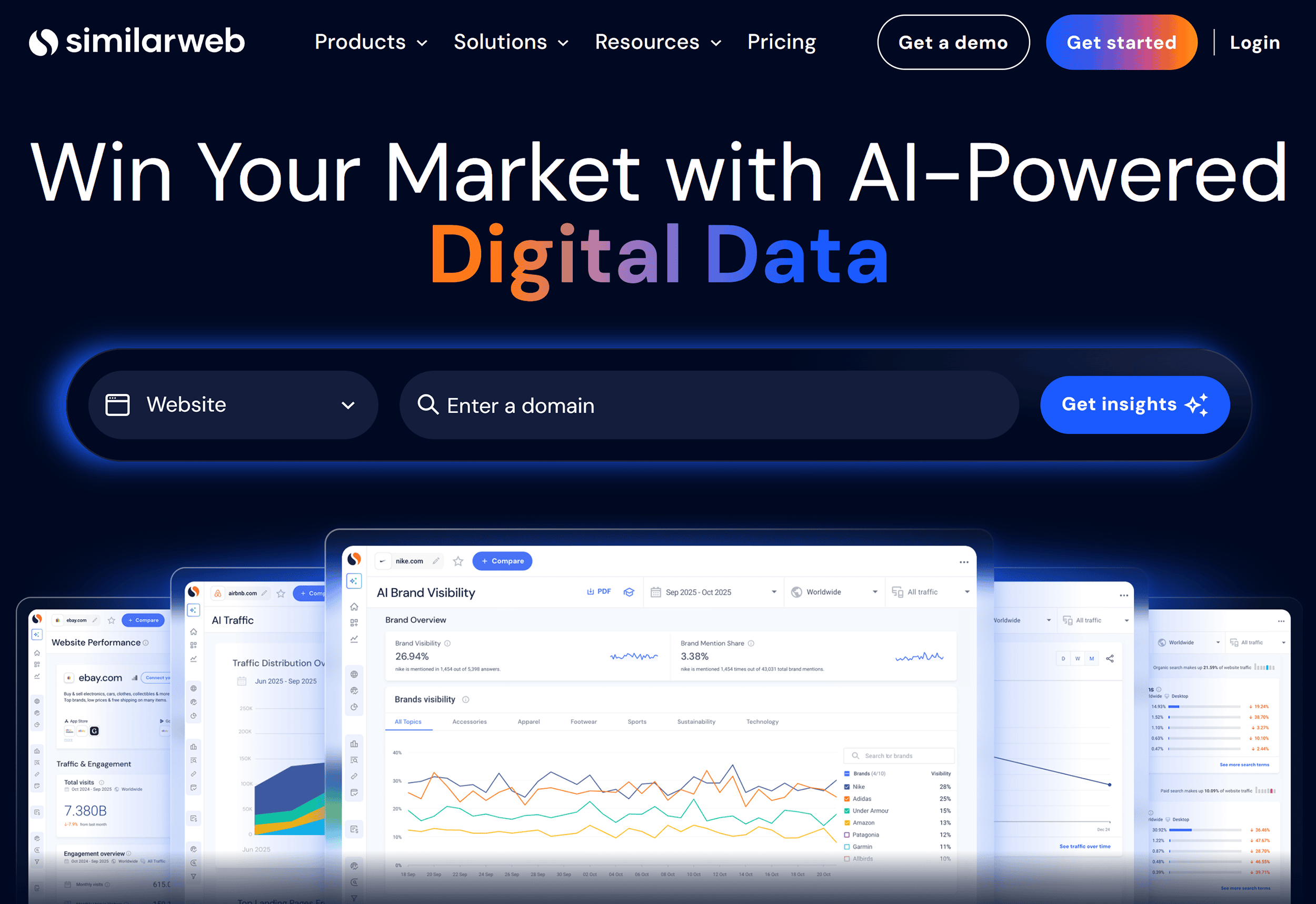
Similarweb reveals your competitors’ complete paid strategies, from their winning ad creatives to their most successful publishers.
It also includes SEO and competitive intelligence tools in every subscription, so you get the full picture of how your rivals attract and convert traffic across every channel.
This cross-channel context is especially helpful if you already use native ad libraries but want scalable intel that ties everything together.
Learn Your Competitors’ Highest-Performing Publishers and Ad Networks
If your competitors are running ads, Similarweb shows you where (and how to beat them).
You’ll see:
- Which ad networks and placements work best for your top competitors
- Where their ad budgets go, broken down by channel
- Industry-wide trends that reveal missed opportunities
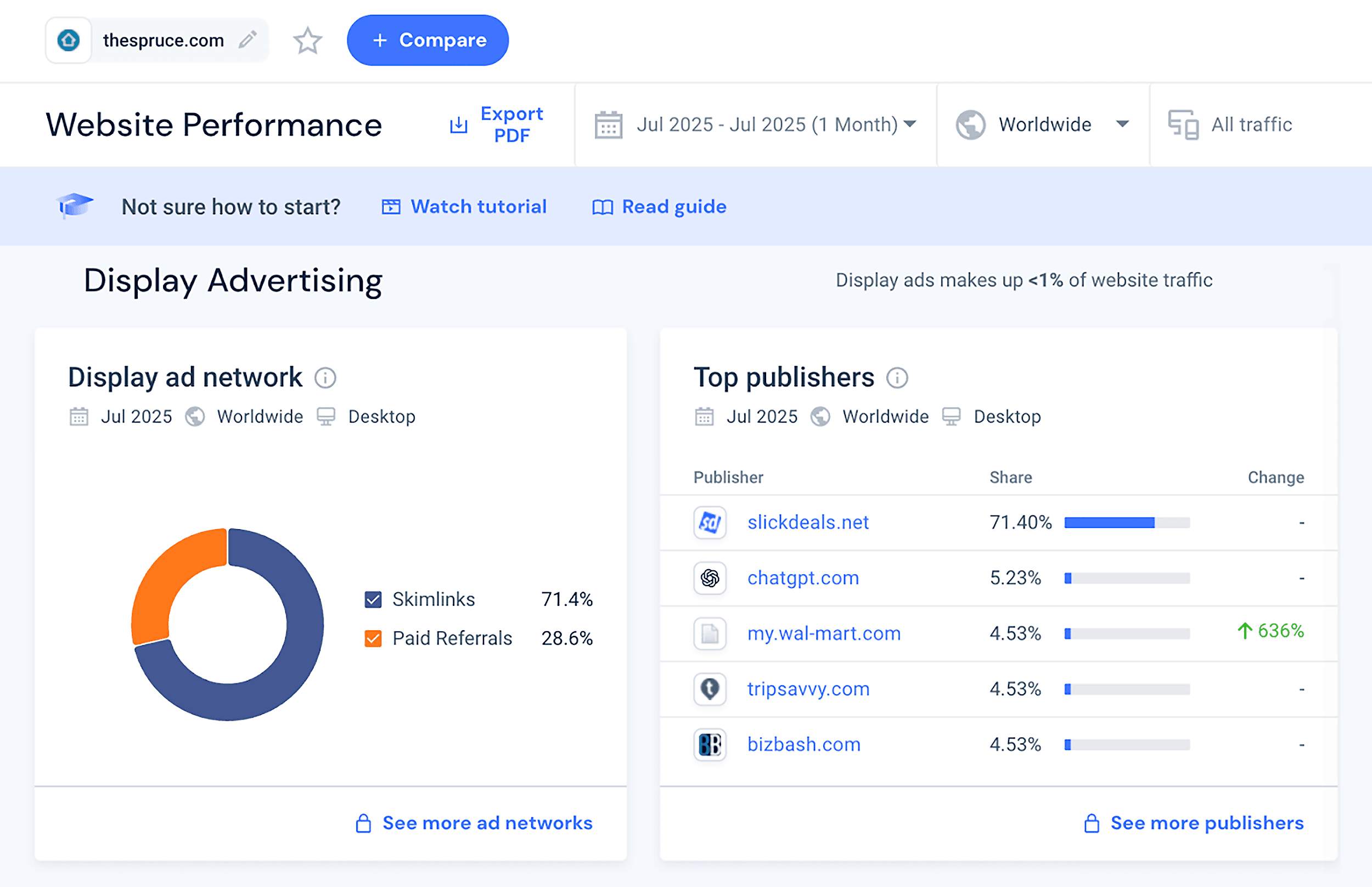
Say Similarweb shows that multiple competitors spend over 50% of their display budgets on a single publisher.
That’s a data-backed signal you can’t ignore.
Use that data to target the same publisher to test similar placements. Or find underused publishers in the same category for more affordable traffic.
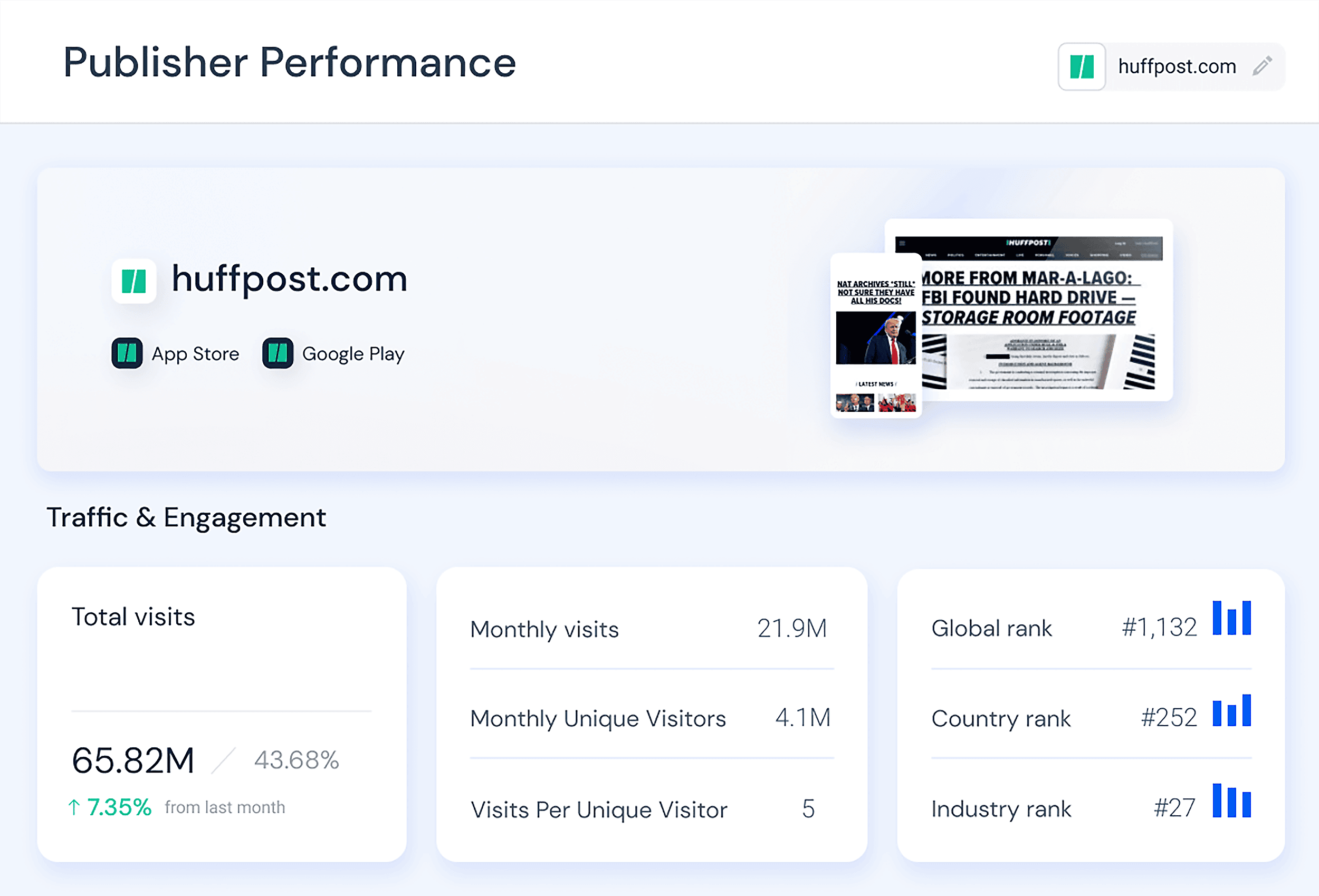
Get Inspired by Proven Ad Creatives
Similarweb’s database makes it easy to browse display ads by publisher, network, and format.
- See the messaging and offers competitors use to get conversions
- Learn how many days each ad was active, so you know which ones excelled (and which ones failed)
- Find out which formats your competitors are using, including product, display, and video ads
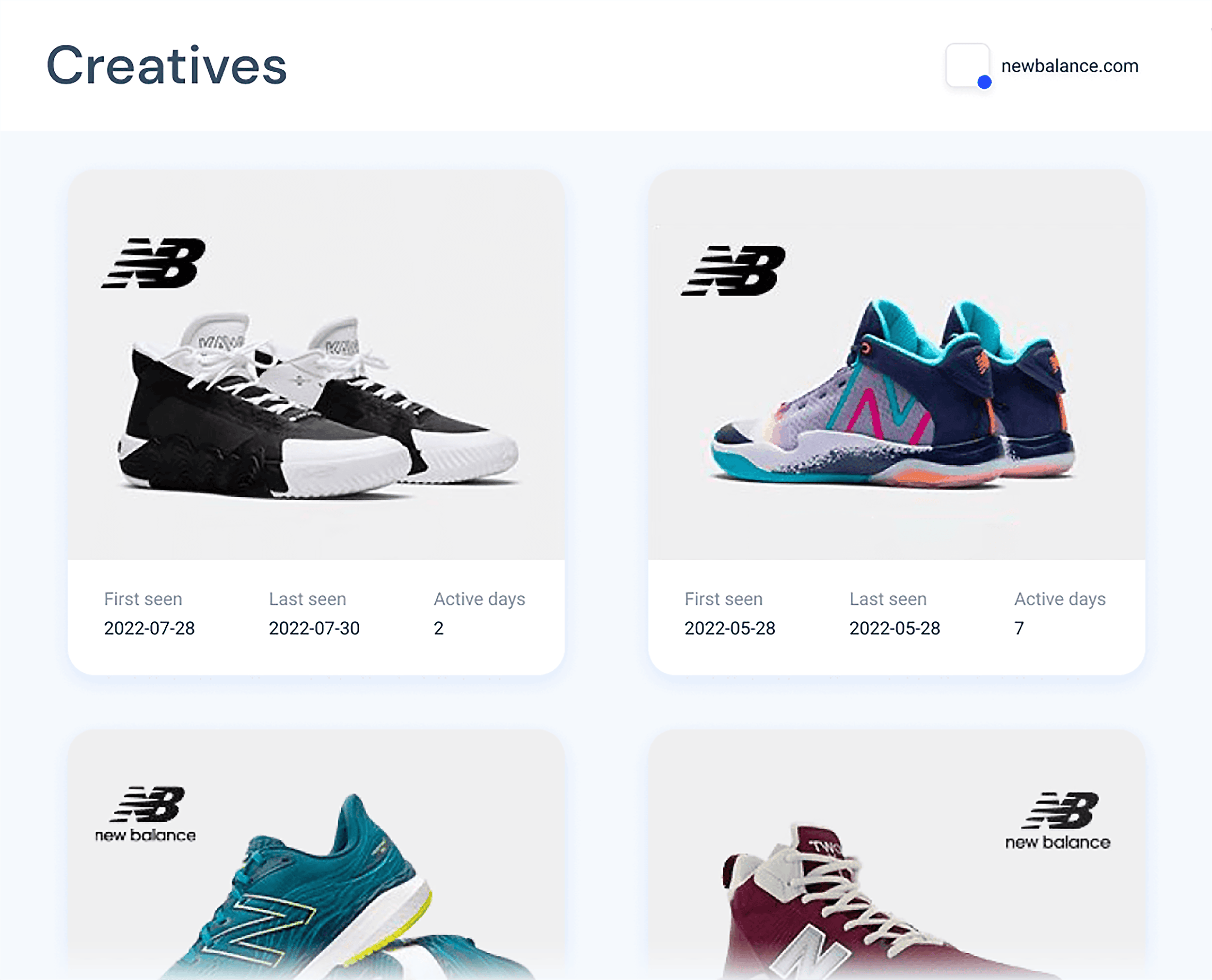
Of course, copying your competitors’ ads word-for-word isn’t the goal.
The real value is in spotting patterns: the hooks they repeat, the formats they invest in, and the offers they continually test.
These insights let you design campaigns that build on what already works in your market.
When you’re juggling multiple accounts, this saves hours of creative testing, and points you directly toward proven formats.
Reverse-Engineer Competitors’ Search and Shopping Campaigns
Similarweb shows you which keywords your competitors bid on and how much they’re spending.
This helps you identify high-value keywords that drive conversions and avoid wasting budget on terms that don’t perform.
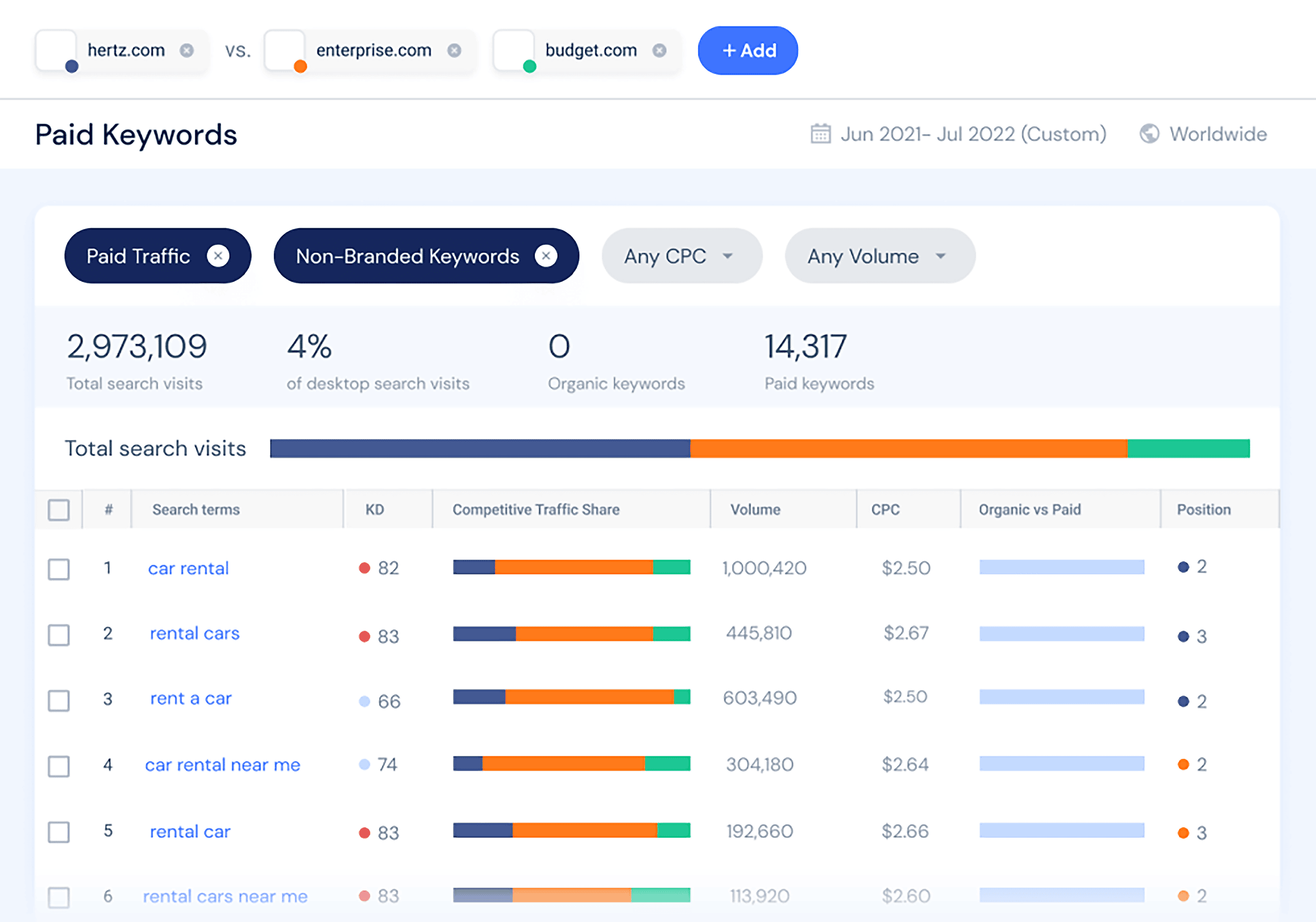
From there, you can build stronger landing pages that target your competitors’ most successful keywords and match intent.
Pros and Cons
| Pros | Cons |
|---|---|
| Tracks 500M+ ads across publishers, networks, and formats for deep competitive insights | Ad intelligence tools only available with the most expensive plan |
| Uncovers competitors’ top-performing publishers and ad placements | Can feel overwhelming for smaller teams due to the platform’s depth |
| Includes SEO, traffic, and market data for a full competitive picture | If you only want ad intelligence, you’ll be paying for much more than you need |
Pricing

Similarweb offers multiple plans, but only the most expensive one includes dedicated tools for ad intelligence.
This plan costs $649/month ($540 billed annually). Similarweb also offers business and enterprise plans, but pricing and tools are not publicly available online.
Further reading: How to Use Similarweb for SEO and Content Marketing
2. Semrush Advertising Toolkit
Best for multi-platform ad intelligence, from Meta and TikTok to Google Shopping
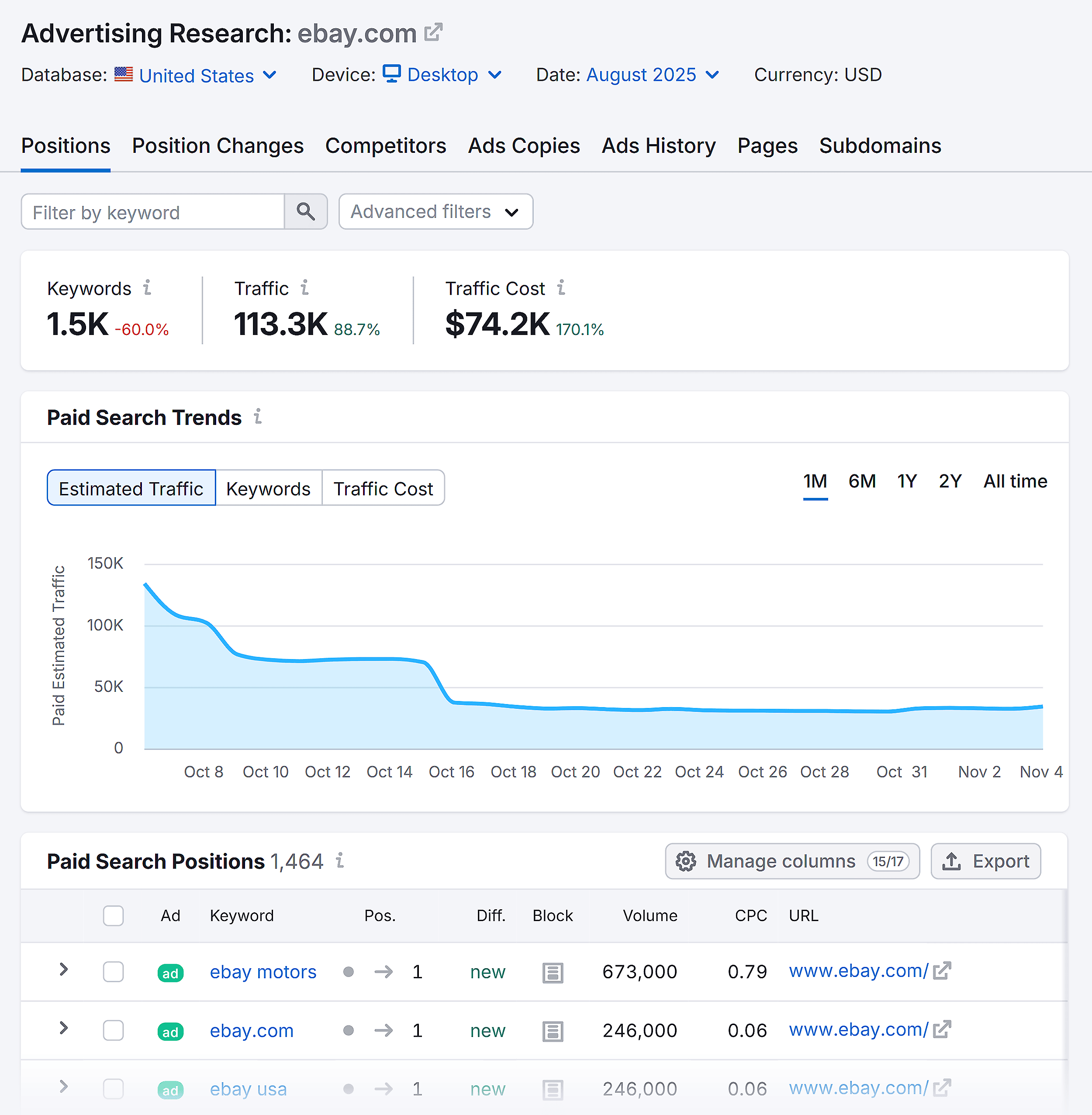
When you’re managing multiple clients or campaigns, switching between Meta, TikTok, and Google dashboards gets messy fast.
Semrush’s Advertising Toolkit consolidates that chaos into one workspace — letting you analyze competitor campaigns and build your own in the same place.
You’ll get deep intel on keywords, budgets, ad copy, and creative trends.
Plus, actionable advice on how to turn that data into high-performing campaigns.
Track Competitor Keywords and Budgets
The Advertising Research tool reveals everything, and we mean everything, about your competitors’ Google Ads strategies.
Enter any domain and you’ll see:
- Estimated ad traffic
- Cost per click (CPC)
- Highest- and lowest-performing keywords
- Organic search position
- Keyword difficulty
- URL
No more wasting ad budget on terms that don’t perform. You’ll know exactly which ones to target in your next campaign.
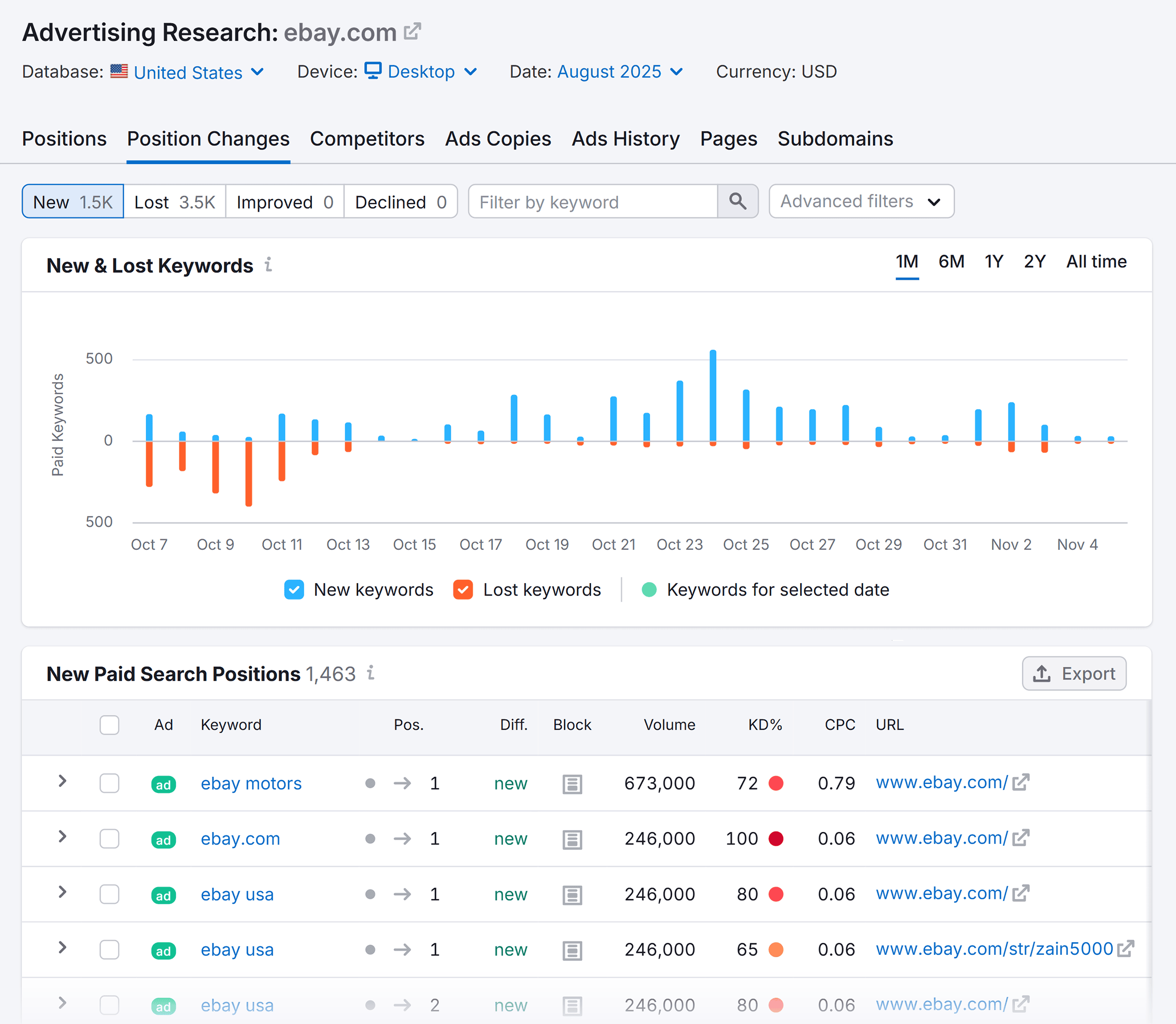
The tool also tracks keyword trends over time.
See which keywords competitors continuously invest in month after month.
When a keyword consistently appears in their paid strategy with stable or growing volume, that’s a clear sign it’s profitable.
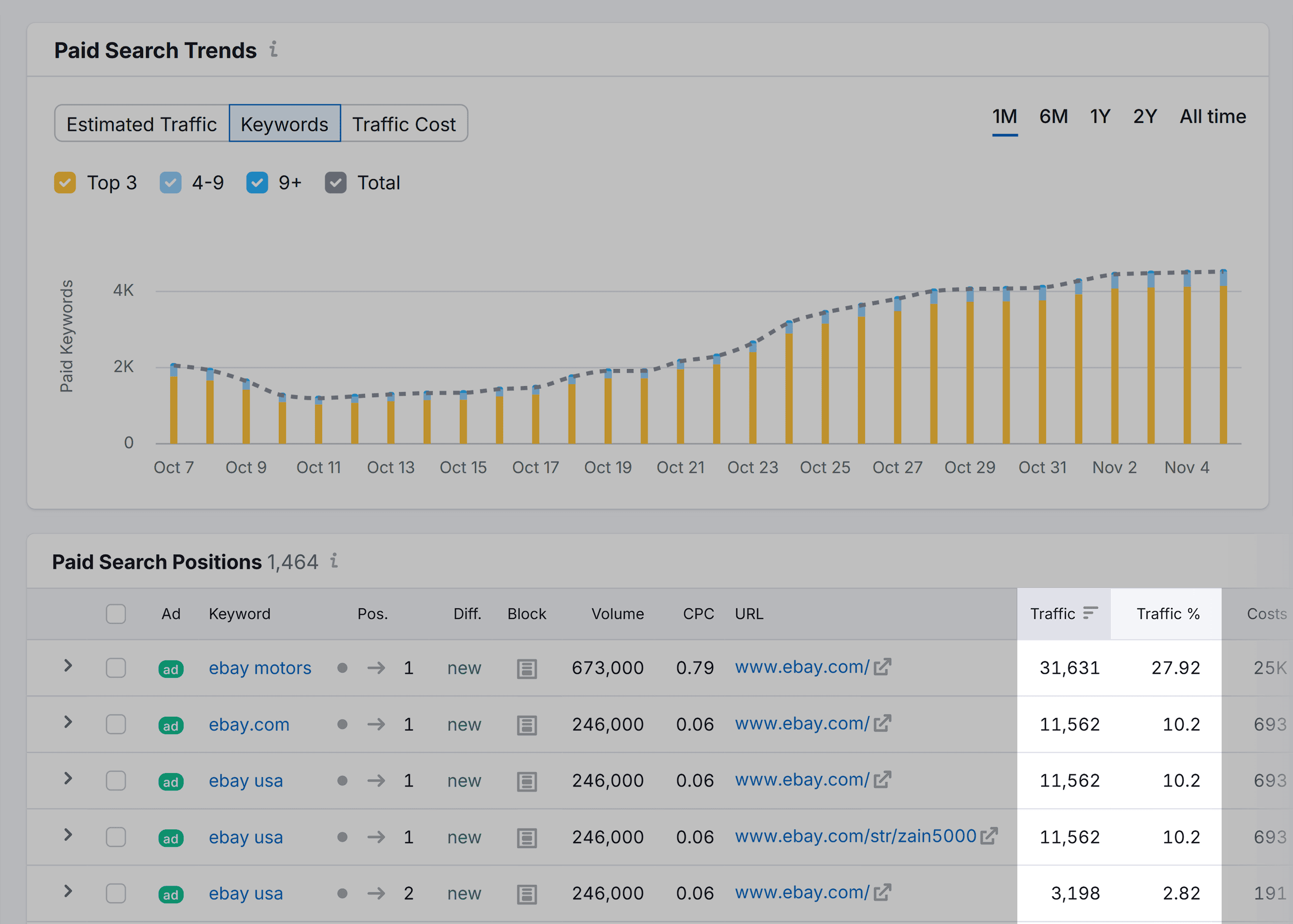
With this data, you might test variations of the keyword in multiple ads to capitalize on its success.
Or use them to inform your broader content strategy beyond paid campaigns.
Spy on Google Shopping Ads
Have an ecommerce brand?
The PLA Research tool shows you which products your competitors promote most heavily in Google Shopping.
You’ll see position, volume, price, product titles, URLs, and trend data for each listing.
When a product shows up month after month, it’s likely a top seller.
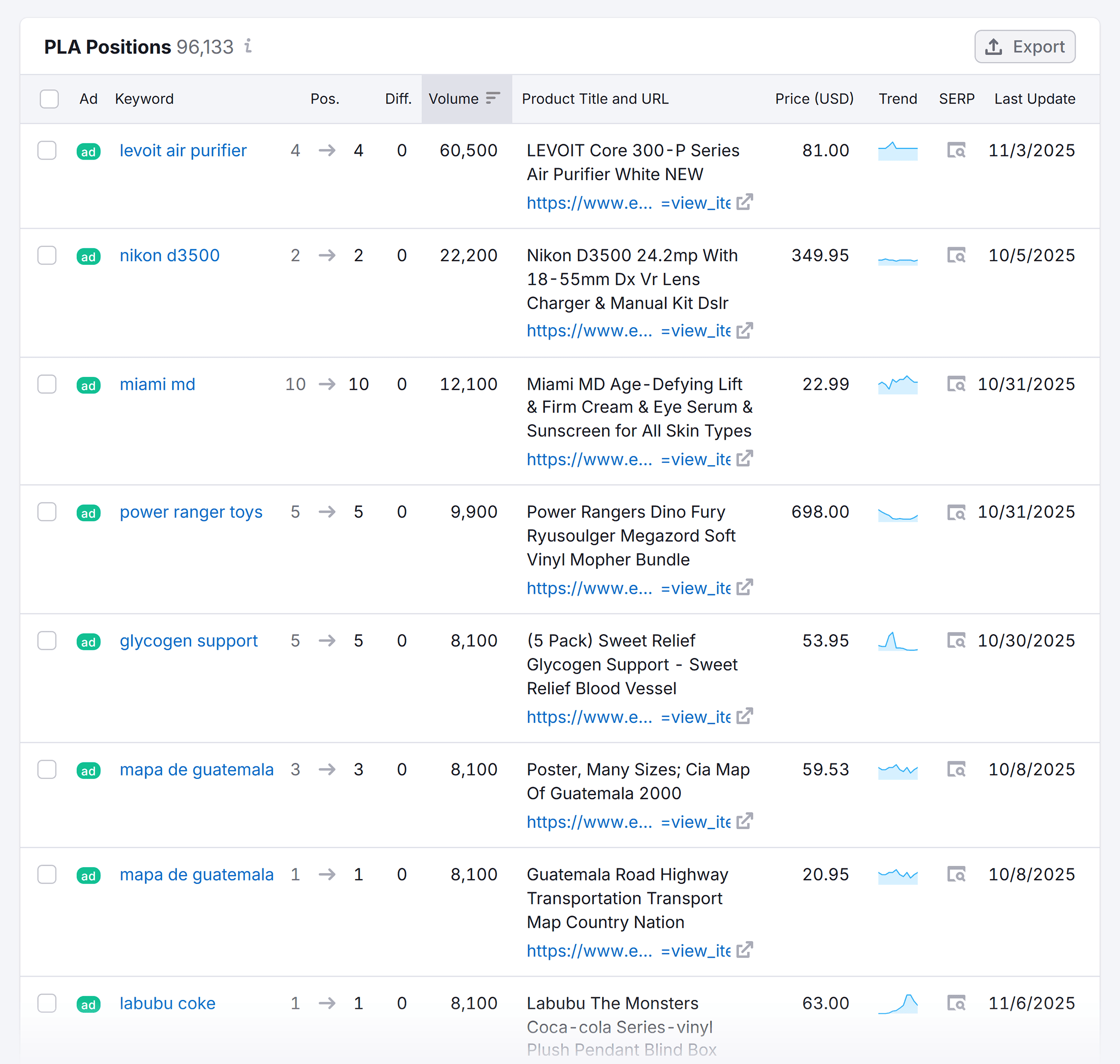
If you don’t carry that product yet, you might consider adding it to your catalog.
Already sell it? Increase your Shopping ads to compete directly.
You can also view all of your competitors’ Google Shopping ads in one place.
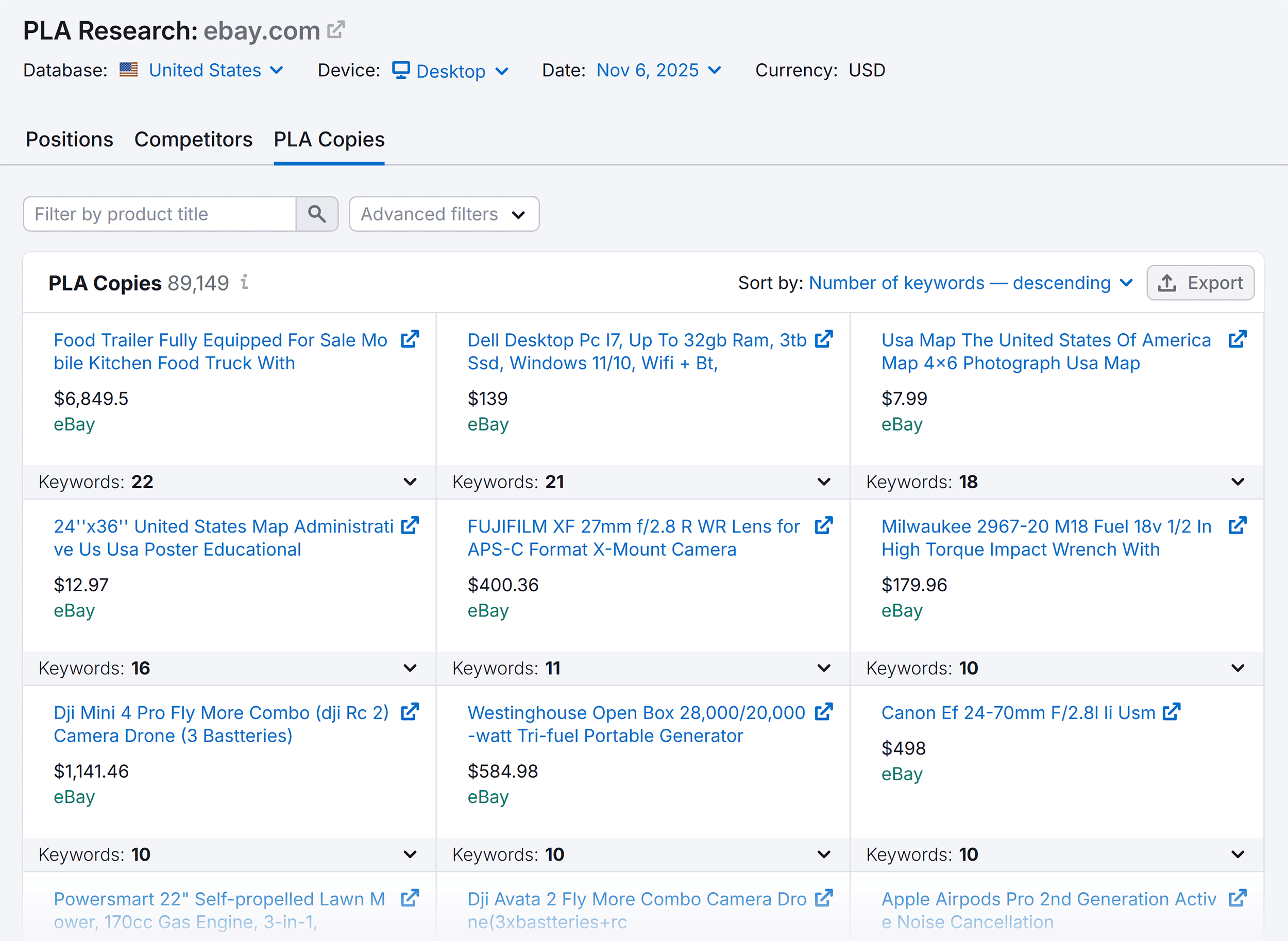
Analyze their copy, images, and offers.
Then, apply these insights to your own listings:
- Adjust your product titles to match high-performing formats
- Test pricing strategies that undercut or match theirs
- Prioritize ads for products where you have a competitive advantage. Think better reviews, faster shipping, or exclusive features they don’t offer.
Here’s another cool feature:
Instead of bouncing between tools, Semrush’s AI-powered Ad Launch Assistant lets you create and optimize Google and Meta ads directly inside the platform.
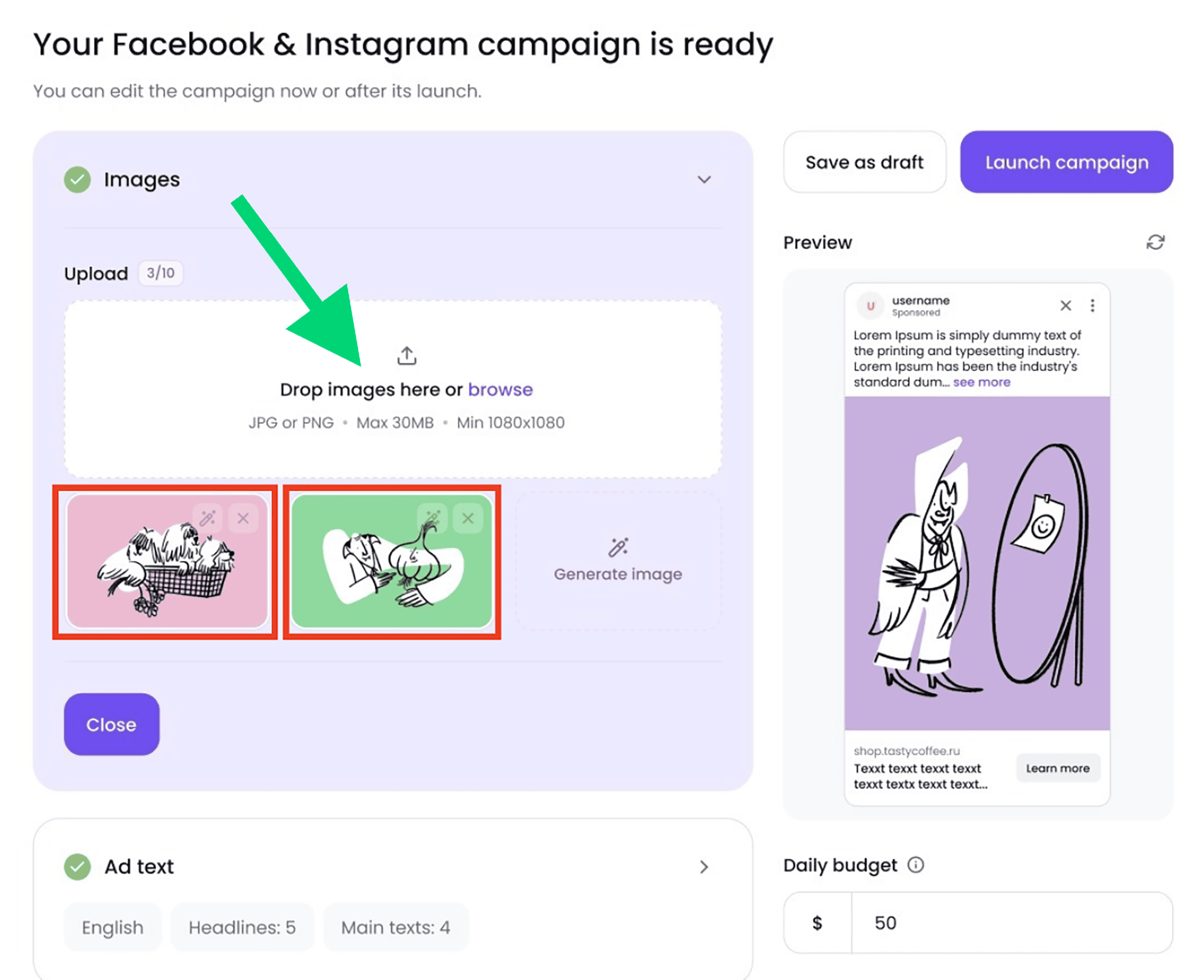
The tool generates copy and visuals tailored to your brand, from attention-grabbing headlines to conversion-focused descriptions.
Instead of writing everything from scratch, all you have to do is review each element:
- Headlines
- Descriptions
- Site links
- Callouts
- Images
- Videos
Simply refine the voice and messaging as needed. You’ll be able to test multiple variations in minutes instead of hours.
Unlock Deeper Insights with AdClarity
AdClarity is Semrush’s advanced cross-channel ad intelligence tool.
Need complete visibility into competitor display, social, and video campaigns?
This is where you’ll find it.
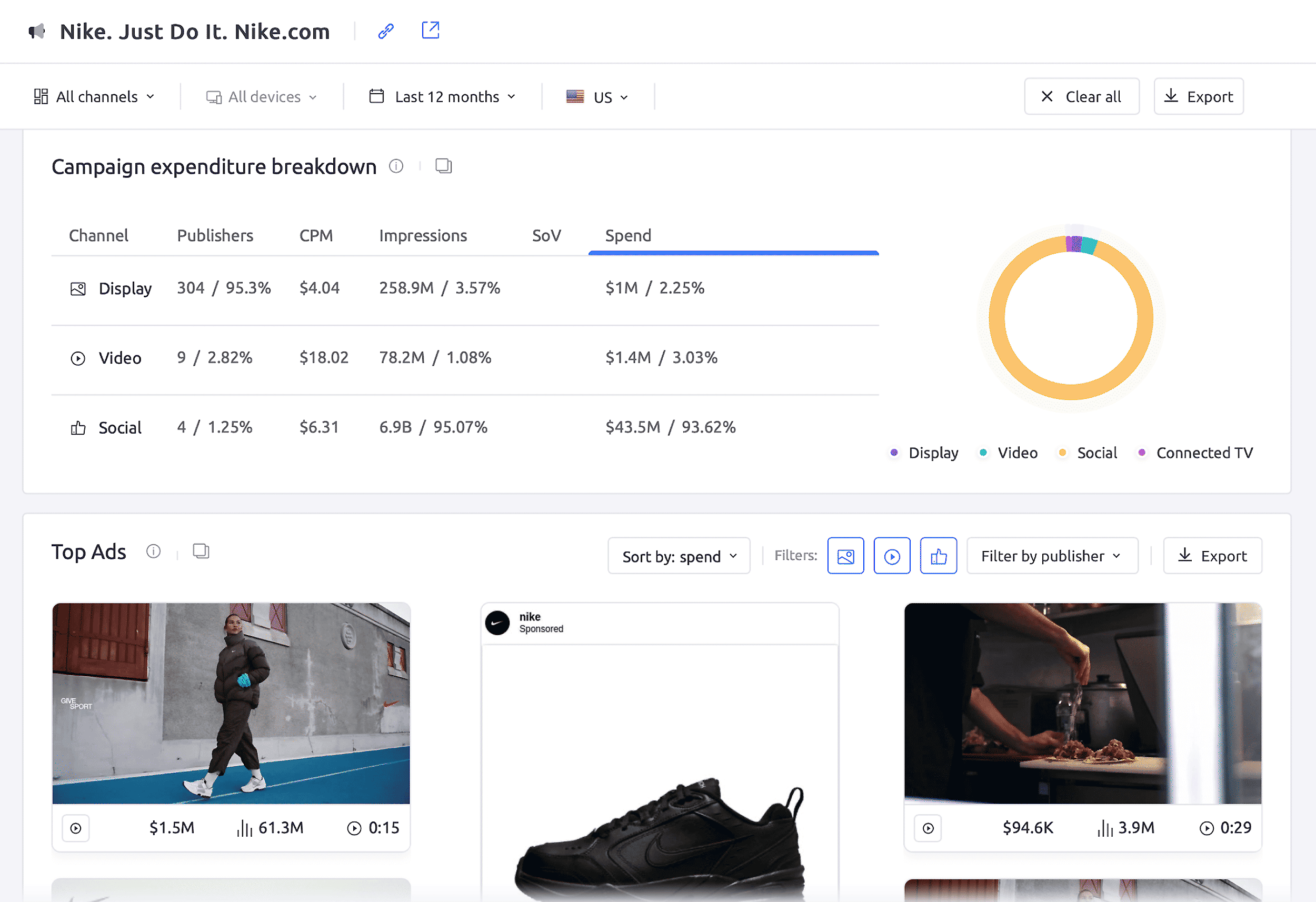
You’ll get a lot of data with this tool.
Including how much rivals spend, which publishers drive the most impact, and the exact creatives they’re using across platforms:
- X
- Google Display
- YouTube
- TikTok
Say a competitor suddenly doubles their TikTok spend. You’ll spot the shift immediately and can adjust your strategy in real time.
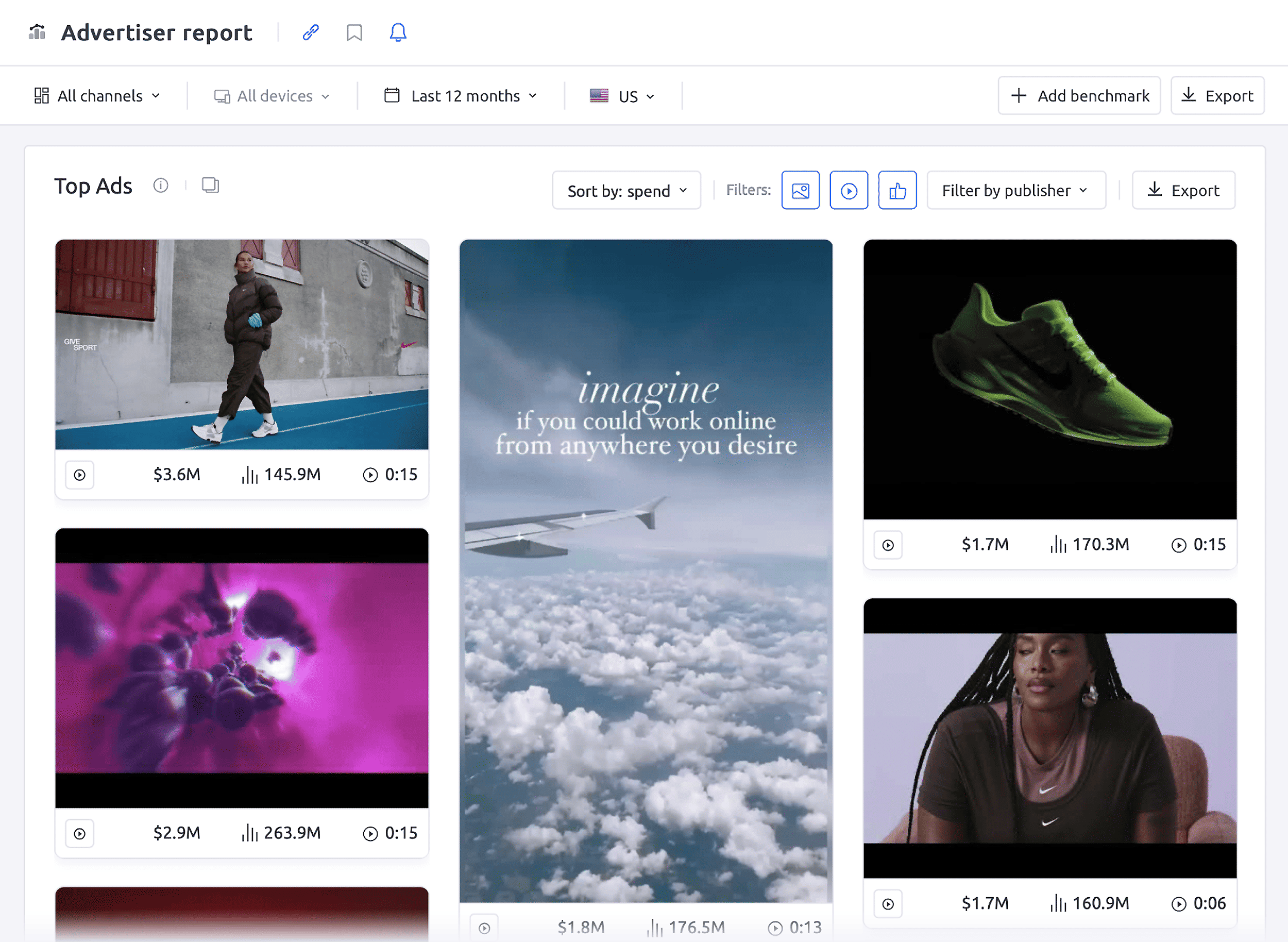
AdClarity also automatically identifies your competitors’ top publishers and campaigns.
So there’s no guessing or testing which ones work well for your target audience.
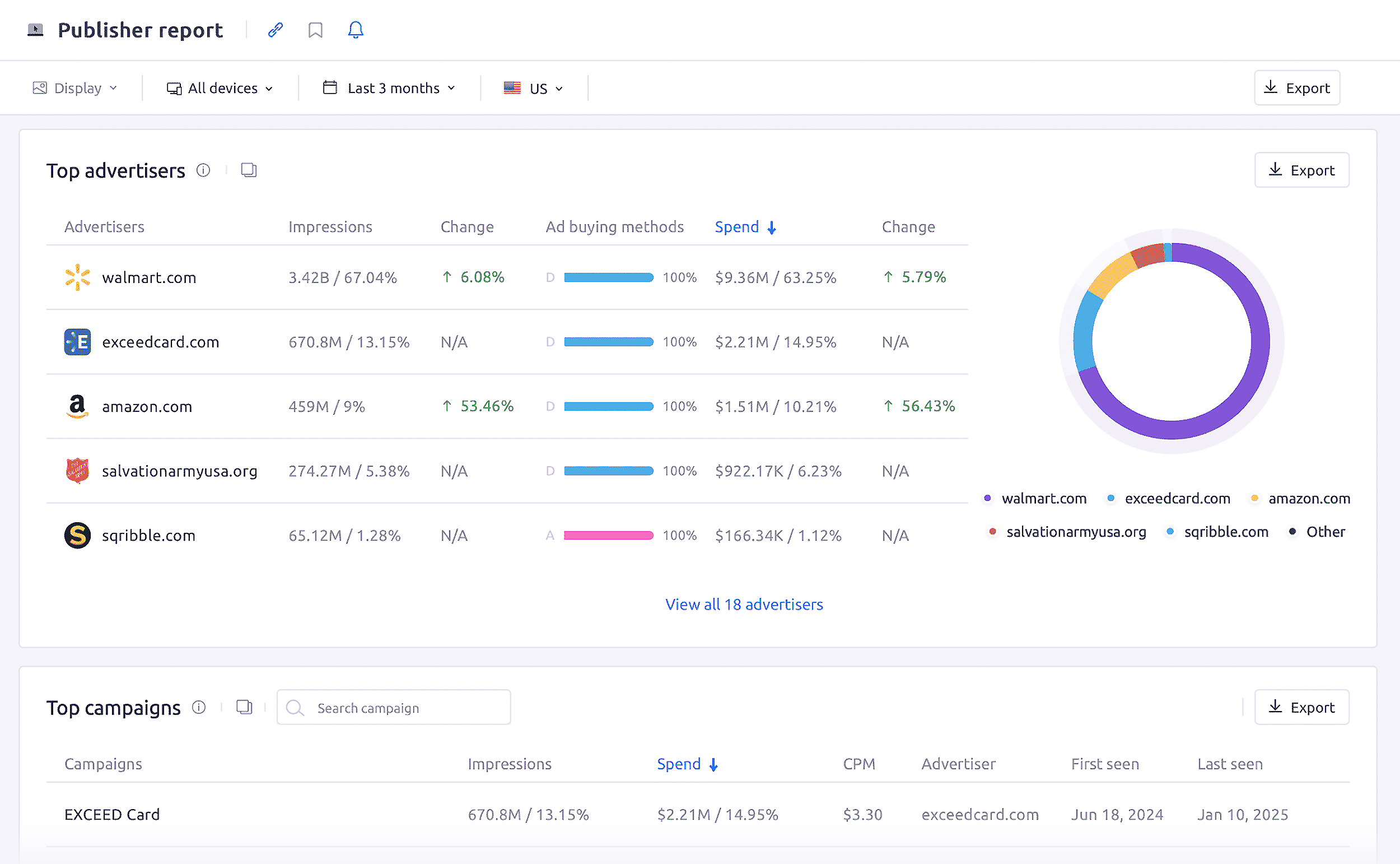
Pros and Cons
| Pros | Cons |
|---|---|
| Combines robust multi-site ad intelligence with Meta and Google campaign execution in one platform | The base plan includes only Google and Meta ad intelligence |
| Google Shopping insights are especially strong for ecommerce brands | AdClarity is only included the higher-tier plan |
| AdClarity offers advanced ad intelligence across display, social, and video | Doesn’t include SEO tools; you’ll need a separate toolkit for that |
Pricing
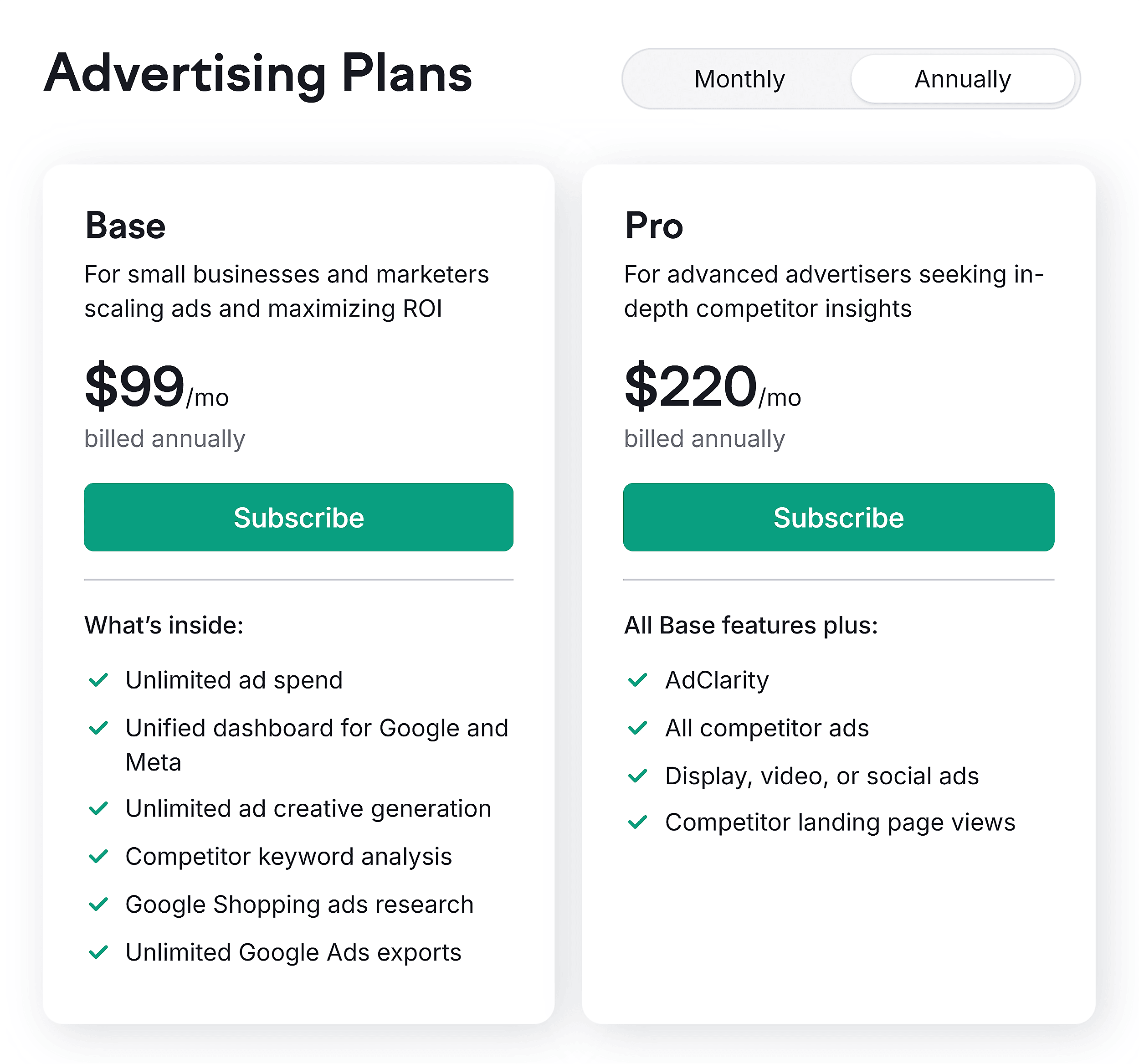
The Semrush Advertising Toolkit is $99 per month.
It includes Advertising Research, PLA Research, Ads Launch Assistant, and more.
The higher-tier plan ($220/month) includes AdClarity, along with all of the above.
3. SpyFu
Best for affordable Google Ads intelligence with deep historical data
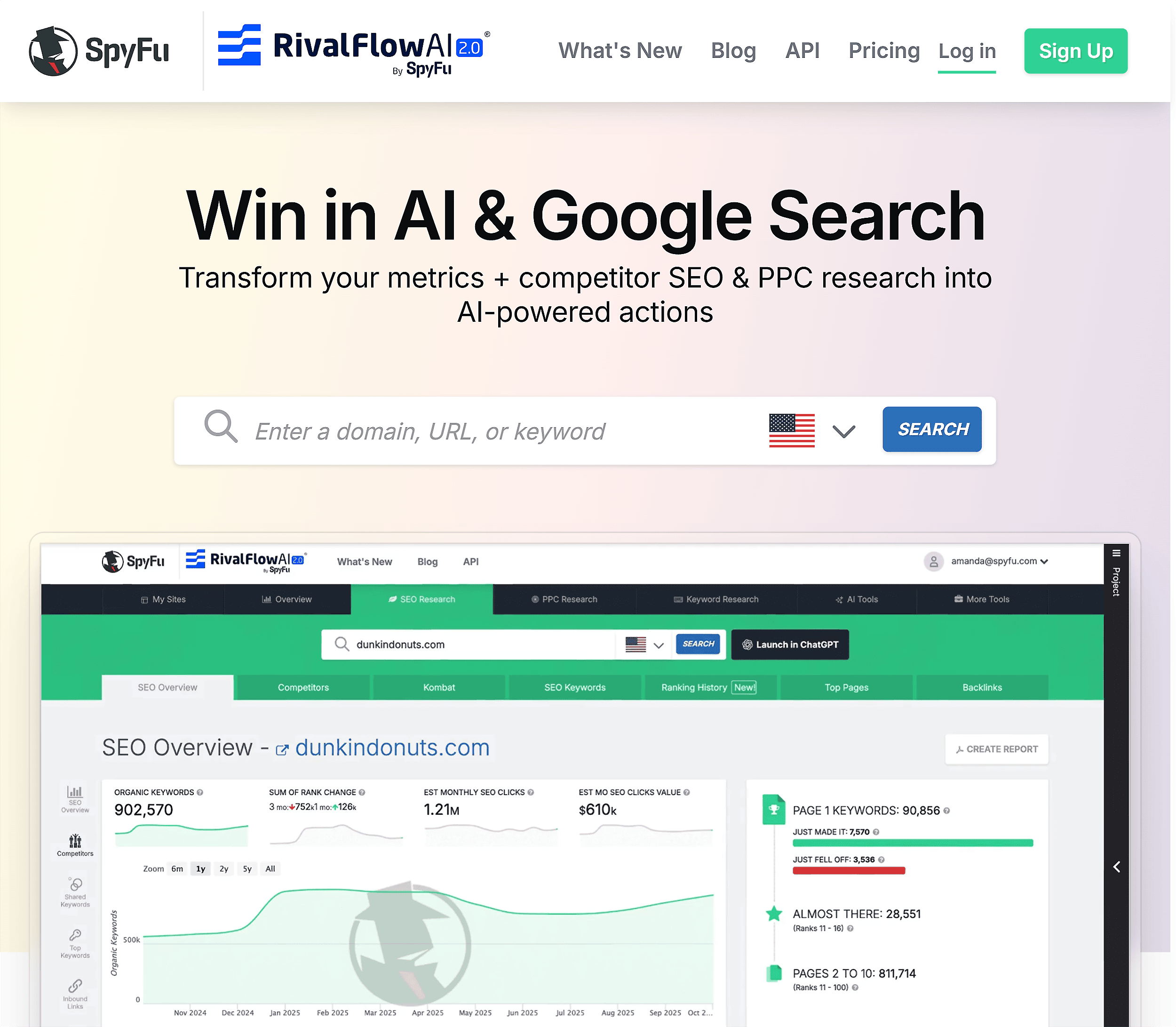
SpyFu is built for one thing: uncovering Google Ads strategies.
If your strategy leans heavily on Google, it’s one of the most detailed and budget-friendly advertising intelligence software options available.
Download Competitor Keywords Without Limits
SpyFu shows you everything your competitors do on Google Ads — and lets you export it all with no limits.
Many ad intelligence platforms cap your keyword downloads, so this is a plus.
Type in any competitor’s domain and you’ll see:
- Every keyword they’ve ever bought on Google Ads
- Estimated monthly clicks and CPC
- Total spend on paid search
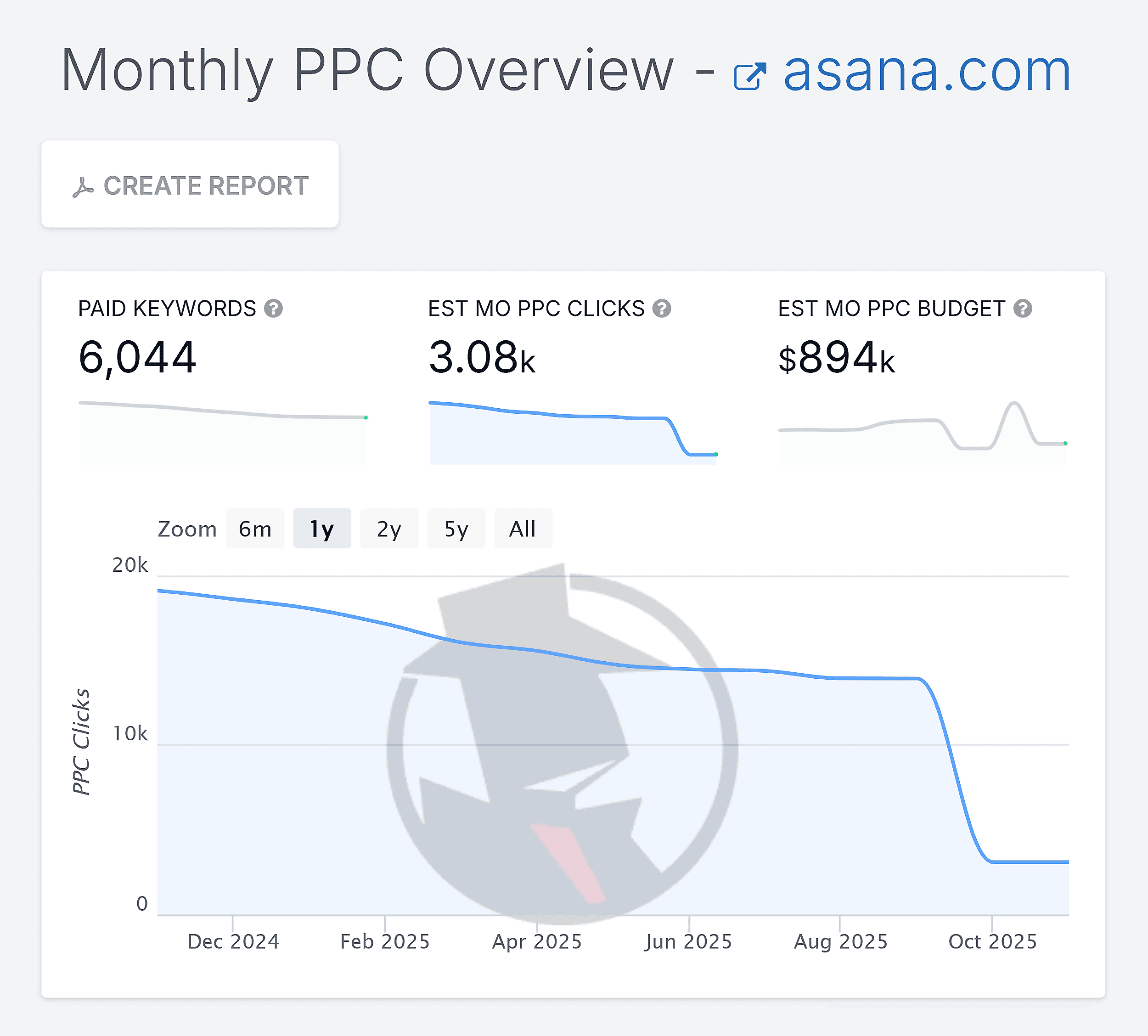
For example, say you’re in SaaS project management and Asana is your top competitor.
Search their domain, and SpyFu shows you their current and historical ad keywords. We’re talking thousands of terms, not just the top 50 or 100.
Download the complete dataset and…
- Feed it into your analytics tools or Google Sheets
- Share it with your team for campaign planning
- Build custom reports for leadership
- Cross-reference it with your CRM to see which keywords actually convert
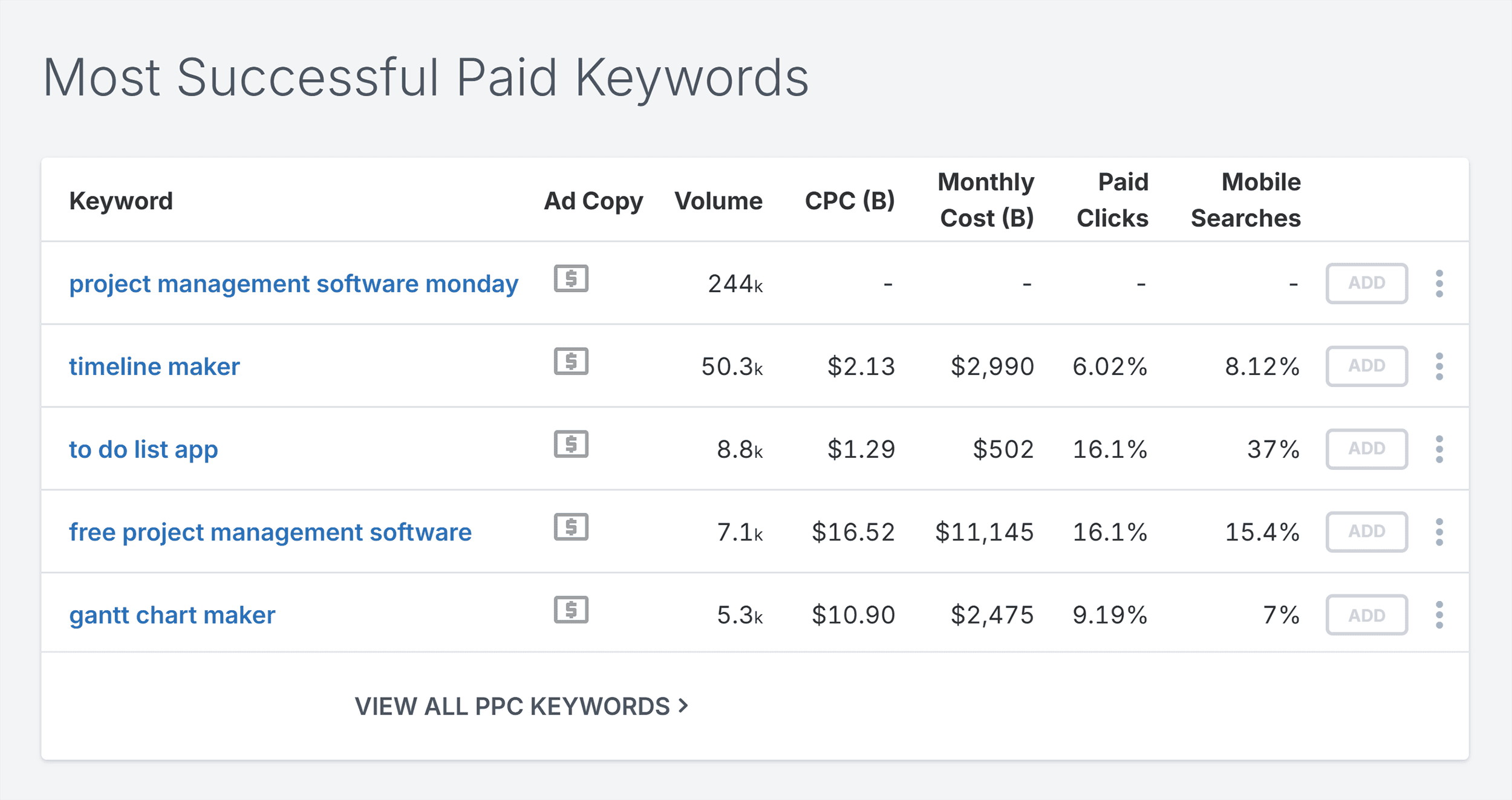
Spot Overlaps and Waste in PPC Strategies
SpyFu’s Kombat tool compares your PPC strategy against up to two competitors at once.
But instead of having to sift through 10,000 keywords, the ad intelligence tool automatically groups them into helpful buckets:
- Core Keywords: Terms all competitors are bidding on
- Consider Buying: Valuable keywords they use, but you don’t
- Potential Ad Waste: Terms that neither competitor uses but you do
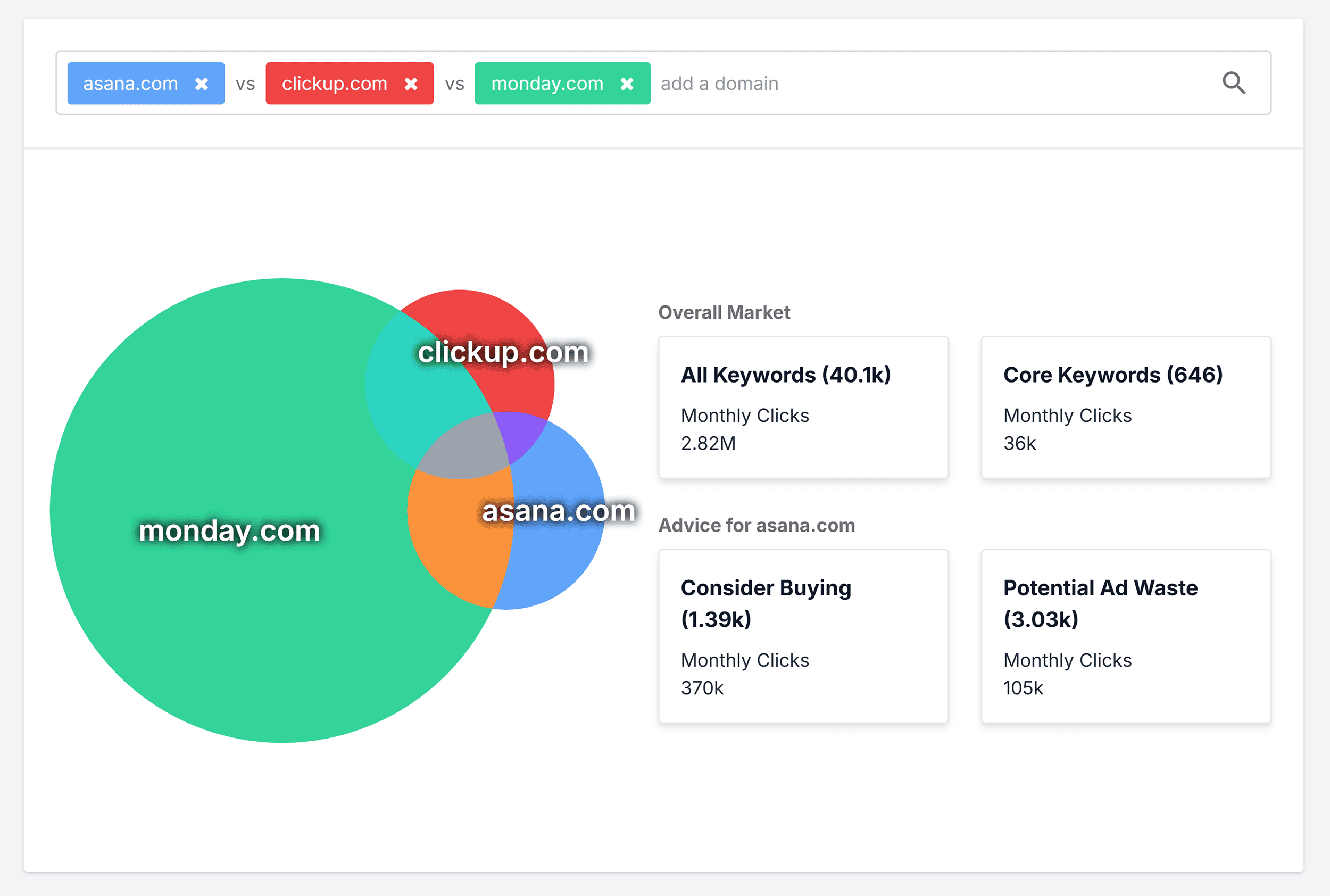
So, you know exactly which terms to focus on (and which to remove from your campaigns).
This is especially helpful if you’re newer to paid campaigns.
Or have limited time (or tolerance) for turning data into actionable insights.
SpyFu also tags certain terms as “Great Buys” and estimates how many impressions you’ll get for each one.
Plus, it shows which competitors already bid on them, so you can piggyback on proven opportunities.
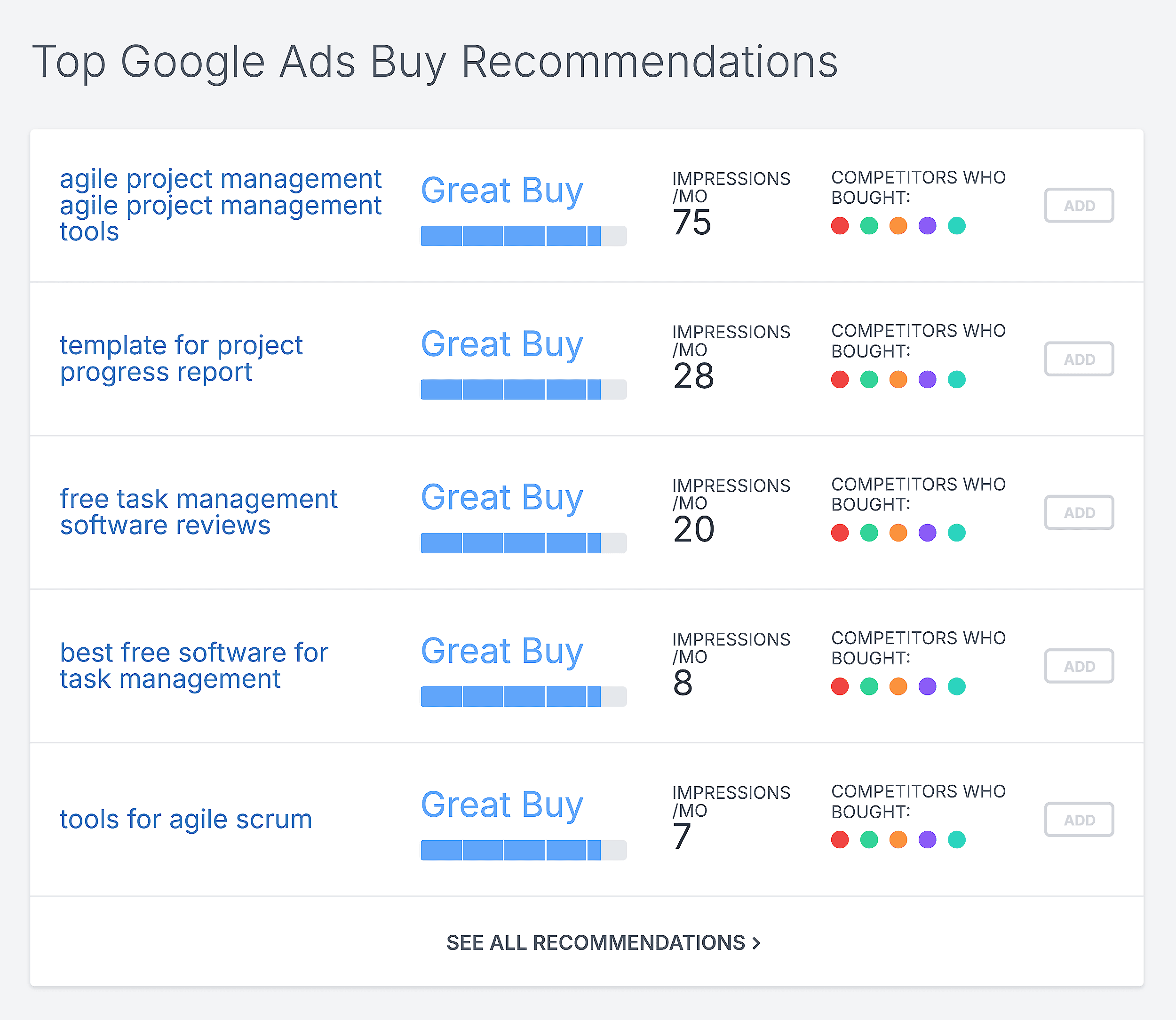
For example, the report below reveals that Asana’s competitor, Monday.com, uses “top task management apps” and “work time tracker app” in its ad strategy.
Asana could (and probably should) target both terms since SpyFu’s data shows they’re worth the investment.
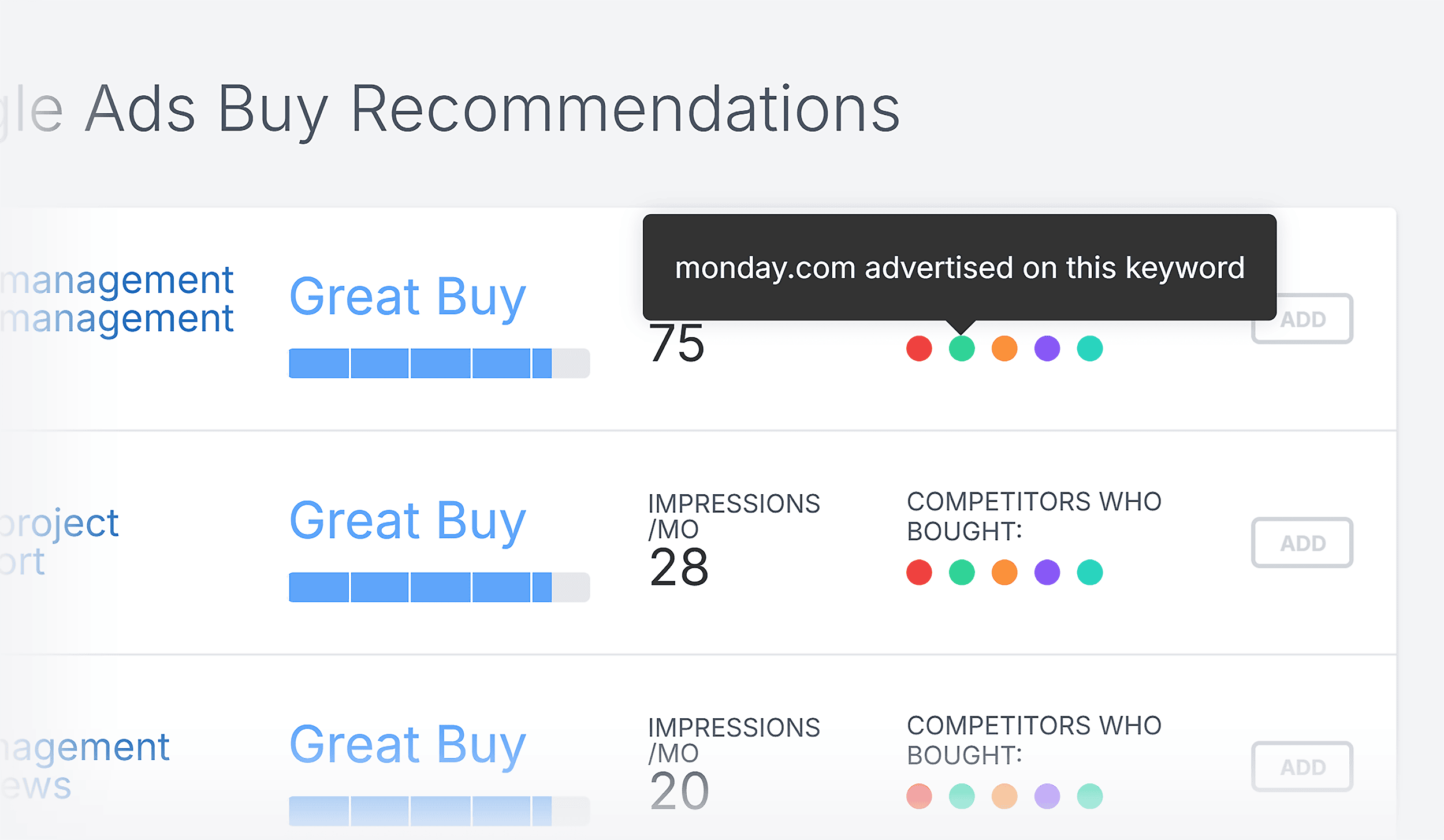
Learn From Ads That Worked (or Failed)
SpyFu’s Ad History tool shows every ad variation competitors have tested for a given keyword.
If an ad copy ran for 14 consecutive months, you know it was effective.
If it vanished after a week? Probably a dud.
This kind of insight lets you write ads with fewer flops and faster wins.
This is especially valuable if you handle multiple accounts. You can skip obvious mistakes and start from proven winners.
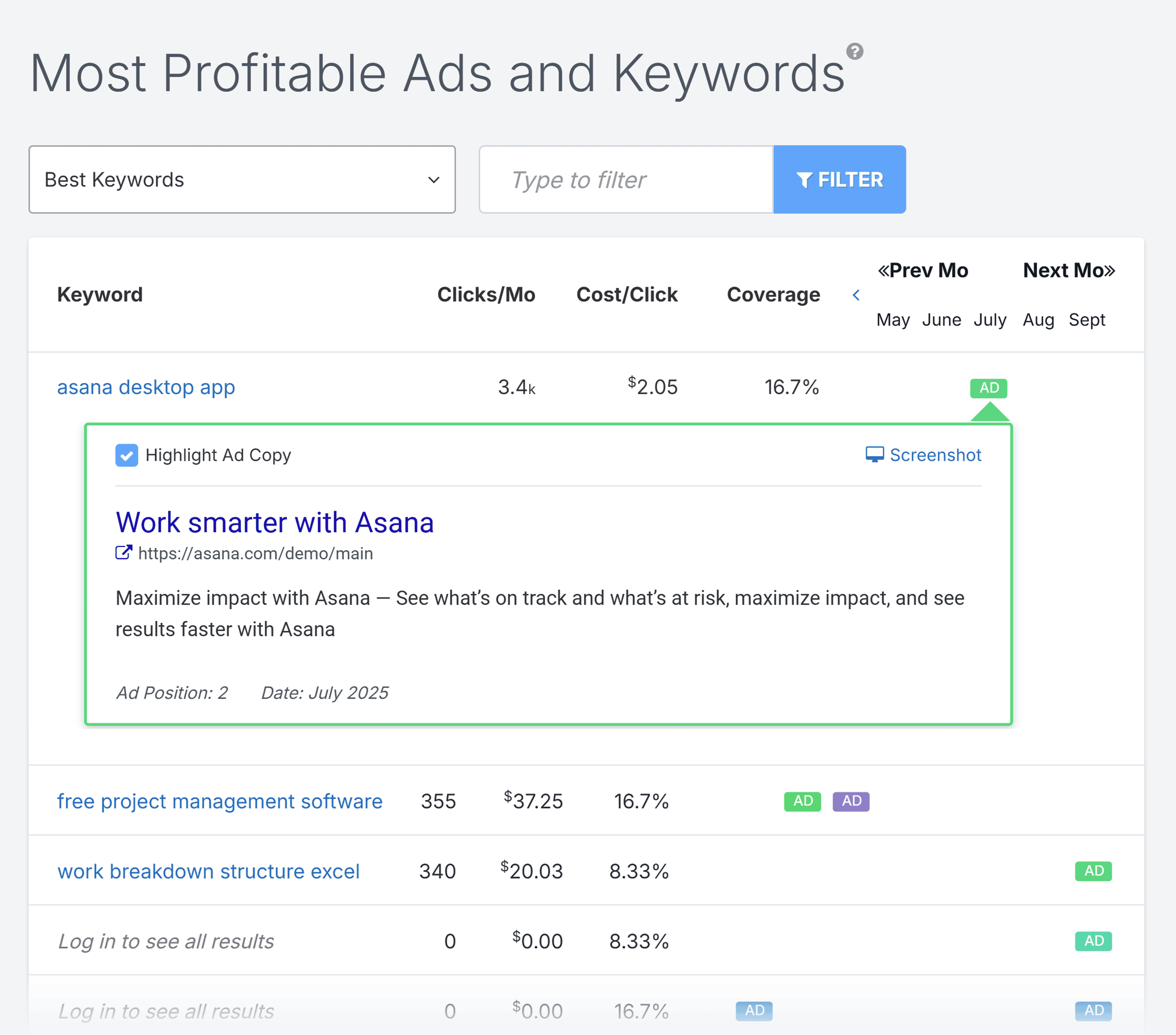
Pros and Cons
| Pros | Cons |
|---|---|
| Unlimited keyword exports with no download caps | Focused exclusively on Google Ads; no social or display coverage |
| 10+ years of historical ad data for deep competitive analysis | Historical data (10+ years) requires paying for higher-tier plans |
| Kombat tool automatically identifies keyword overlaps and wasted spend | The base plan doesn’t come with unlimited downloads |
Pricing
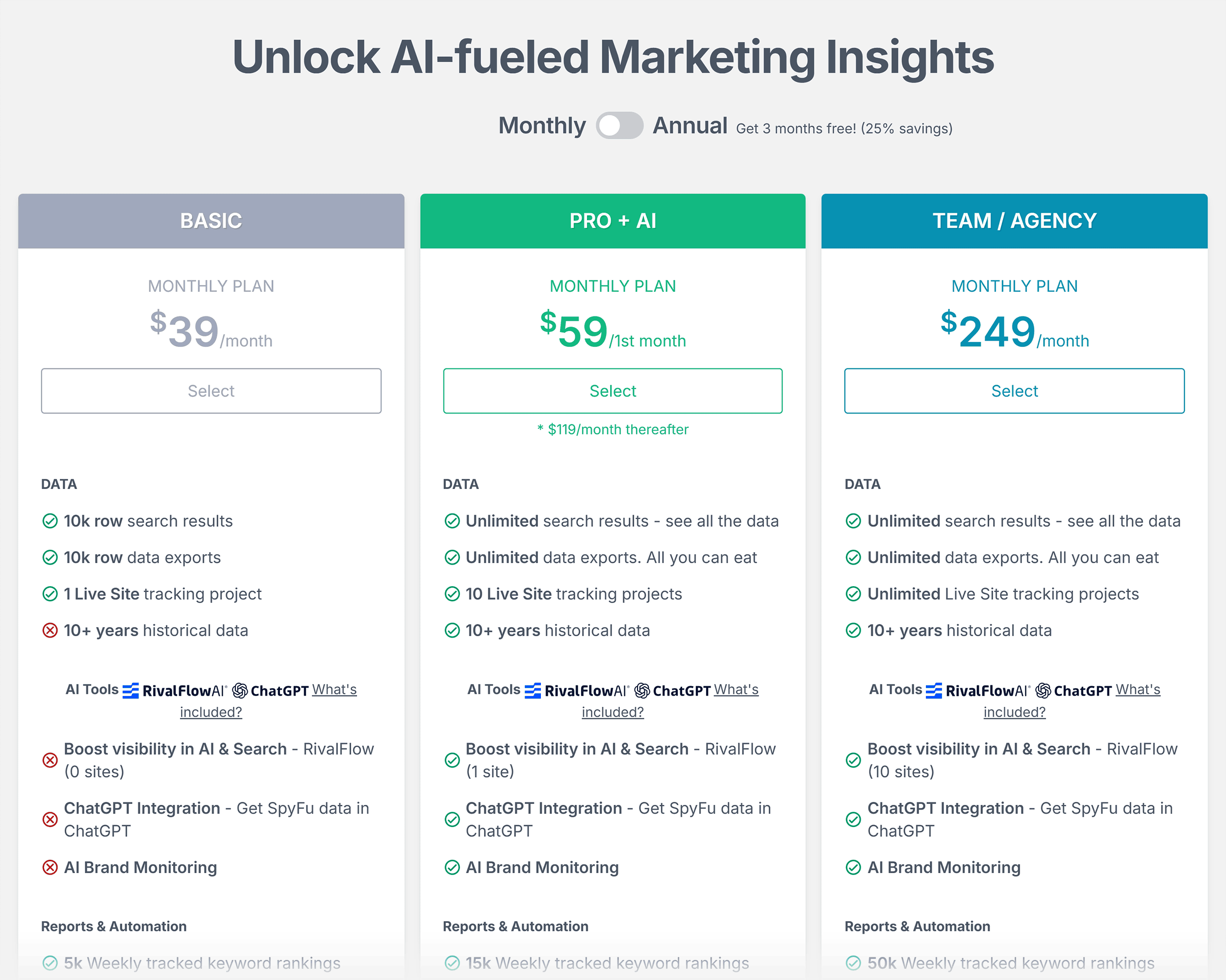
SpyFu offers three main plans, all of which come with ad intelligence and SEO reports.
The most affordable plan is $39 per month.
However, you’ll need to upgrade to a higher tier to get 10+ years of historical insights ($59-$249/month).
Further reading: SpyFu Guide: How to Get the Most Out of This SEO Tool
4. PowerAdSpy
Best for analyzing ad engagement across social media platforms
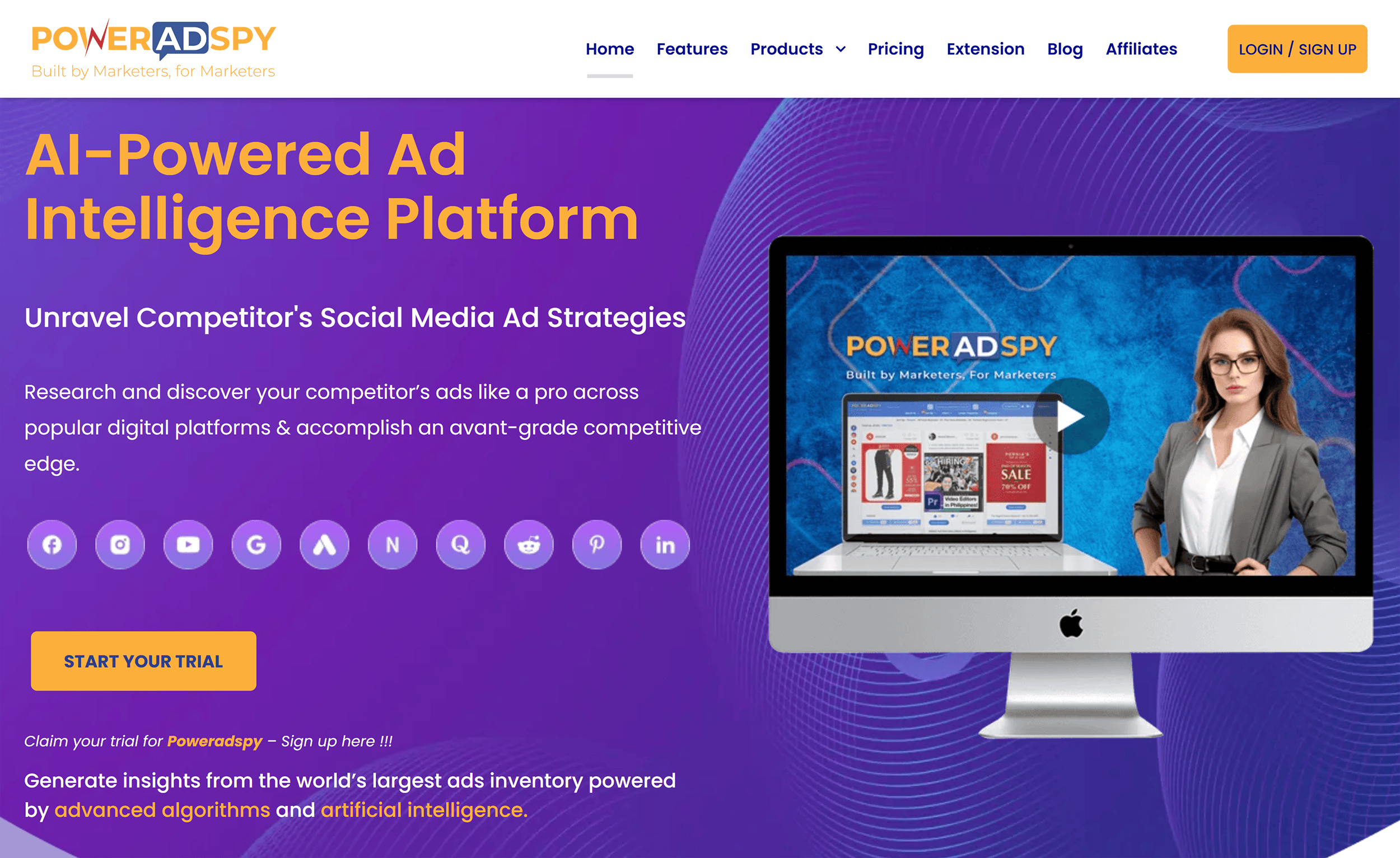
PowerAdSpy specializes in social advertising intelligence with one key differentiator: engagement data that shows what’s actually resonating.
You’ll see which competitor social ads are getting likes, shares, and comments across 11 platforms:
- YouTube
- Google Display Network
- Native
- Quora
- TikTok
If you need to understand which creatives are worth replicating at scale, PowerAdSpy is a strong option.
Search Ads by Keyword, Competitor, or Domain
Want to know which competitor ads crush it on Instagram Reels?
Or which offers rivals push hardest on YouTube or TikTok?
Plug in a keyword, competitor’s name, or domain, and you’ll instantly see all of their active and historical campaigns.
That single search can replace hours of platform hopping between ad libraries.
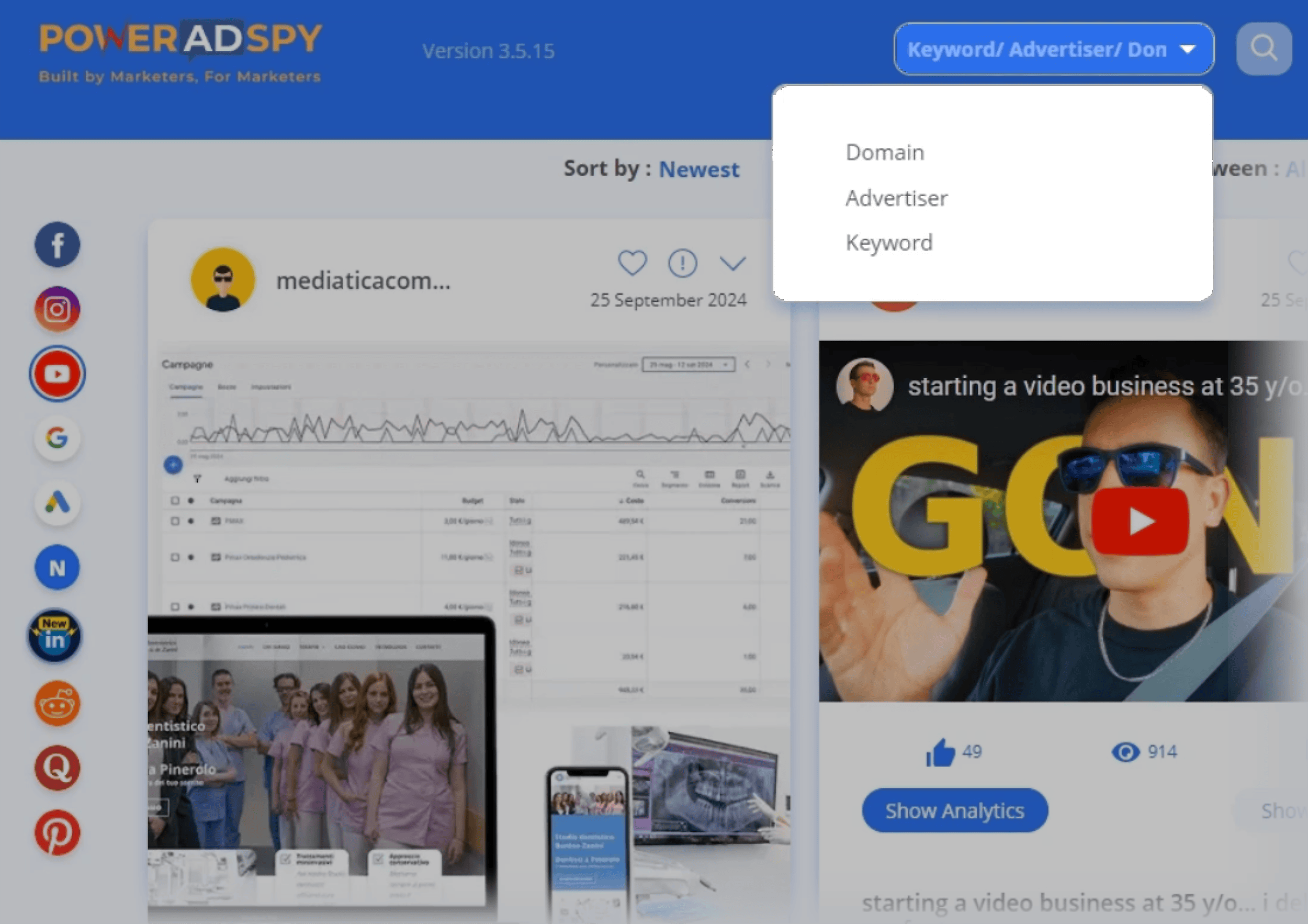
Reveal What’s Actually Driving Engagement
Every ad includes engagement data specific to the platform you’re analyzing.
Assessing competitors’ or clients’ Facebook ads? Sort by likes, comments, impressions, and popularity.
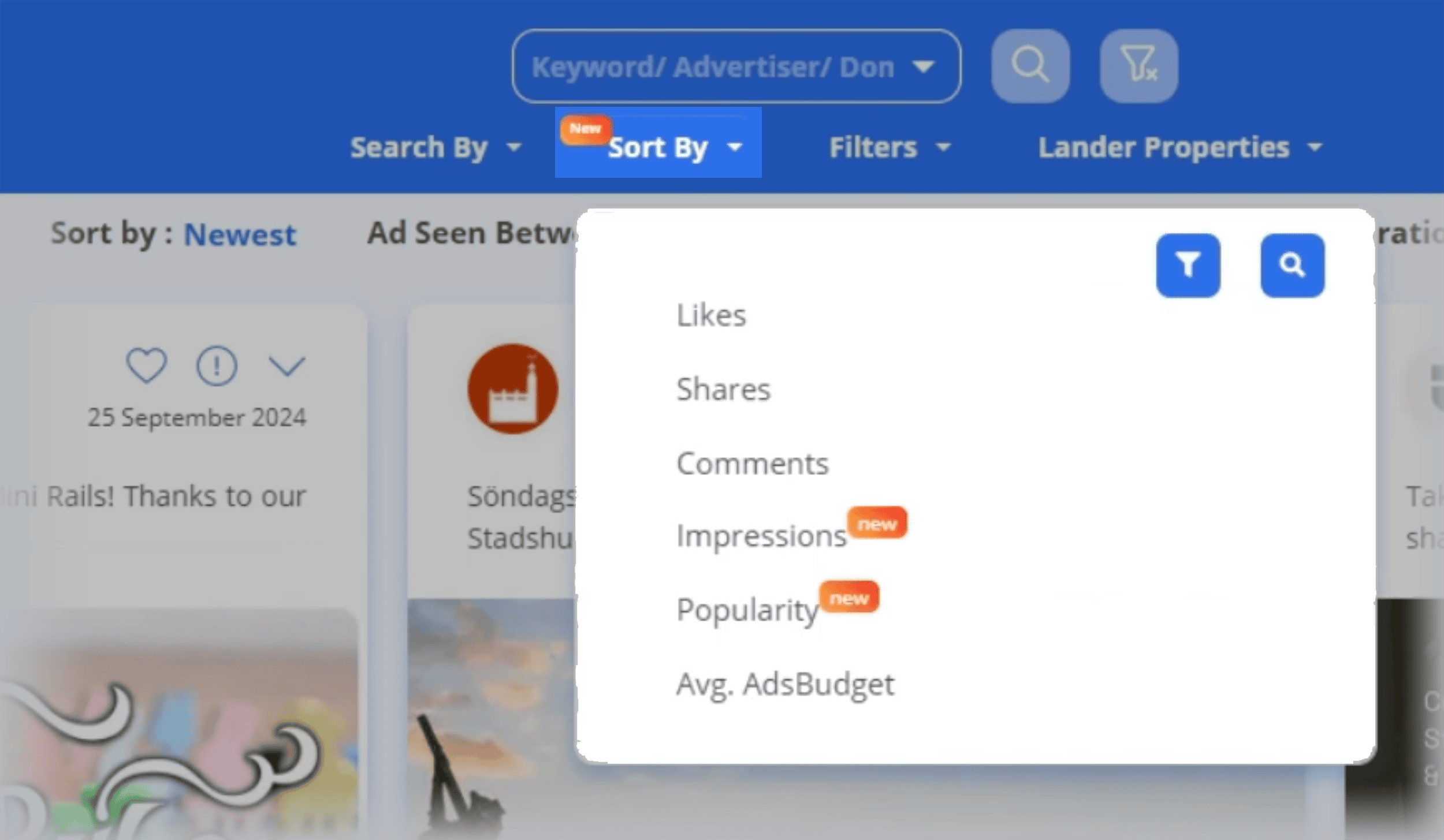
You can also filter by ad type and call to action, depending on the platform.
This is especially useful for spotting:
- Whether video or static images dominate your niche
- Which CTAs (“Learn More” vs. “Sign Up”) consistently get clicks
- What ad hooks (“Free trial” vs. “Save 50%”) keep resurfacing across competitors
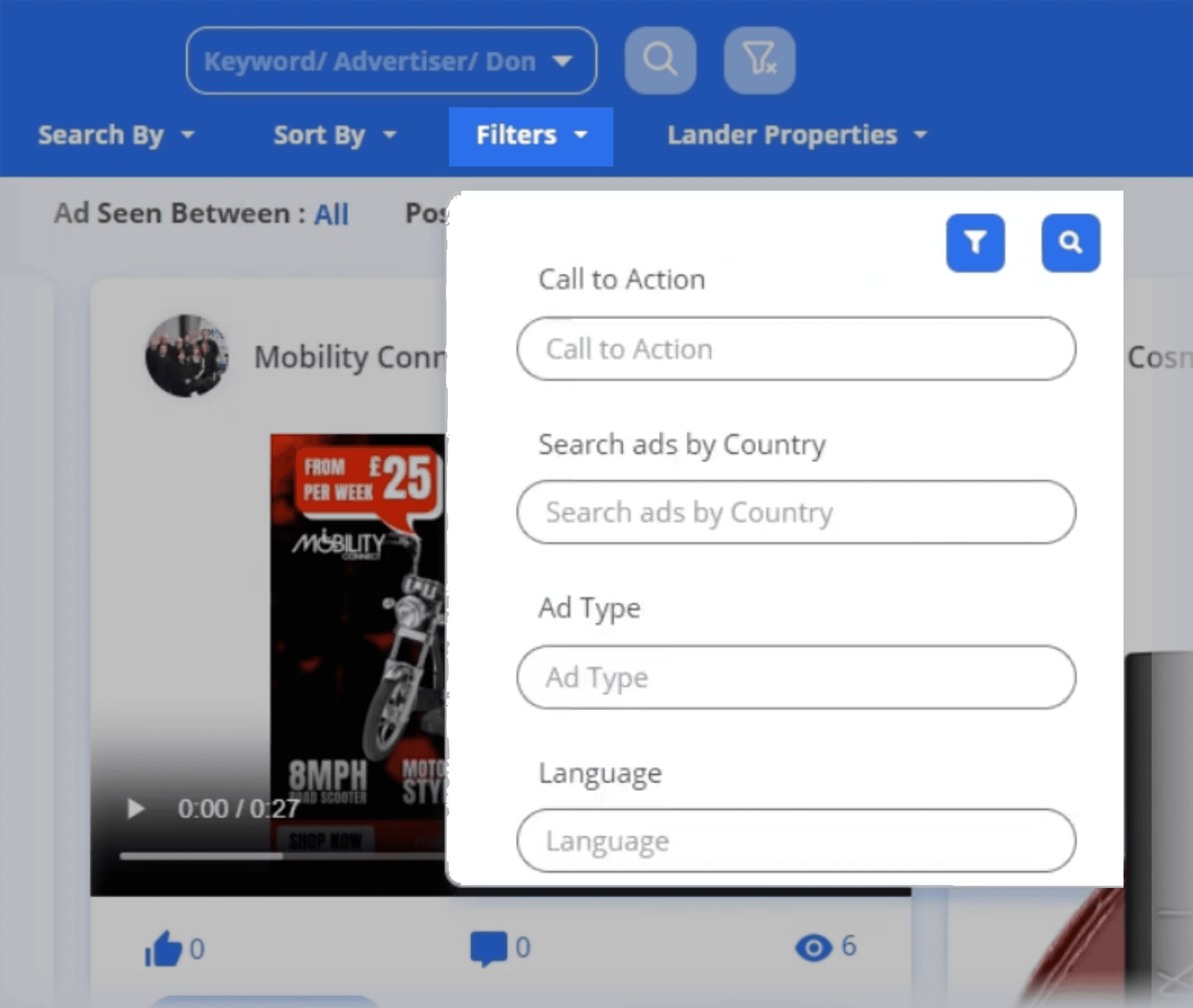
See How Competitors Win Attention on Reddit and Quora
PowerAdSpy tracks sponsored posts on Reddit and Quora.
These platforms matter because buying decisions often start there.
Conversations on these sites can also influence how LLMs (such as ChatGPT and Perplexity) surface your brand in answers.

By analyzing these ads, you’ll see:
- Which threads your competitors target (like “best project management software” on r/productivity)
- How they position offers in Q&A format
- Which ads earn upvotes, shares, and comments
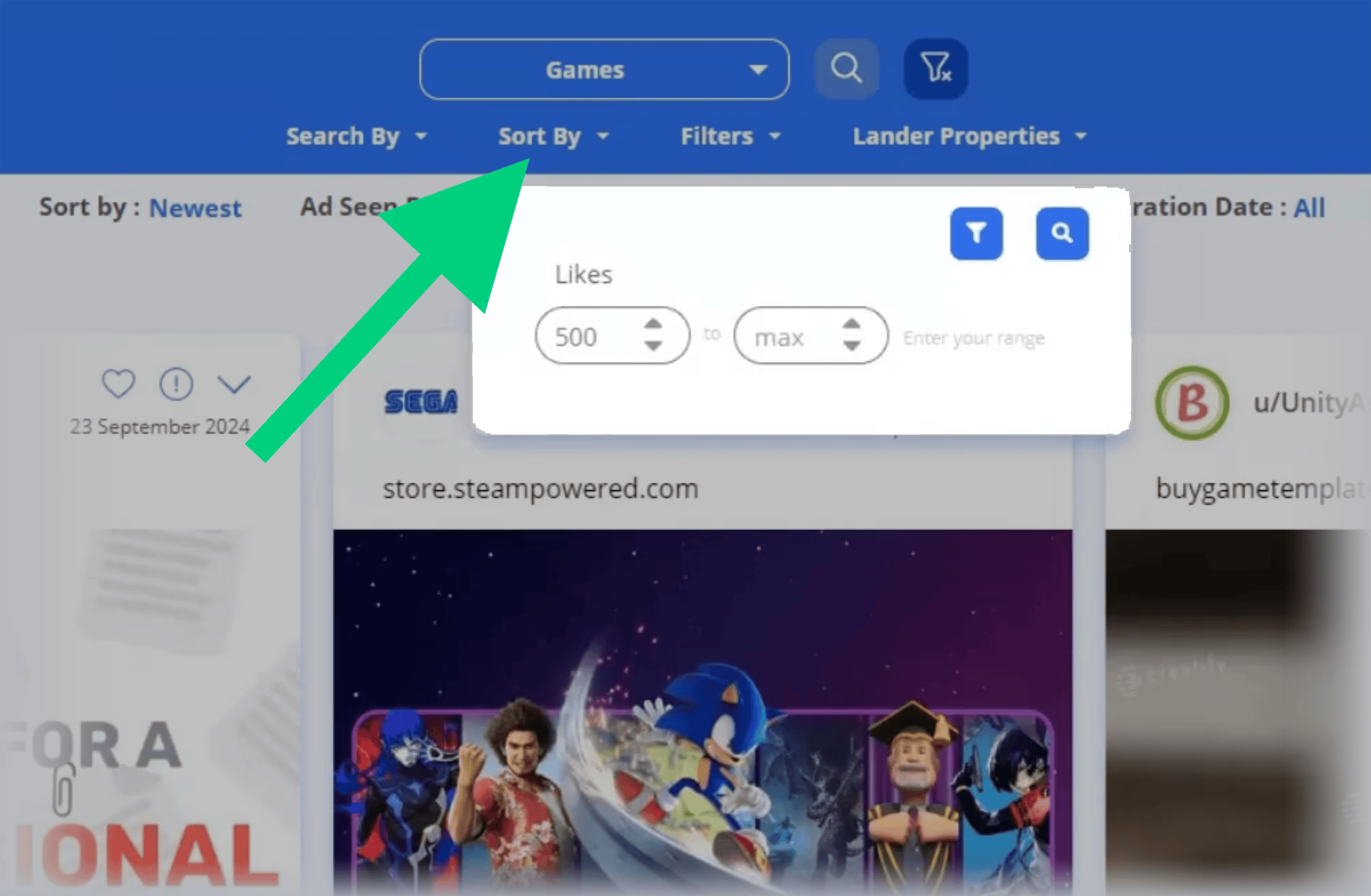
See what competitors are saying and which conversations are shaping buyer intent.
Spot content angles that consistently earn engagement. Identify threads or audiences they’re overlooking.
Another helpful feature?
Search by topic, like “games,” to find the competitors dominating that ad niche.
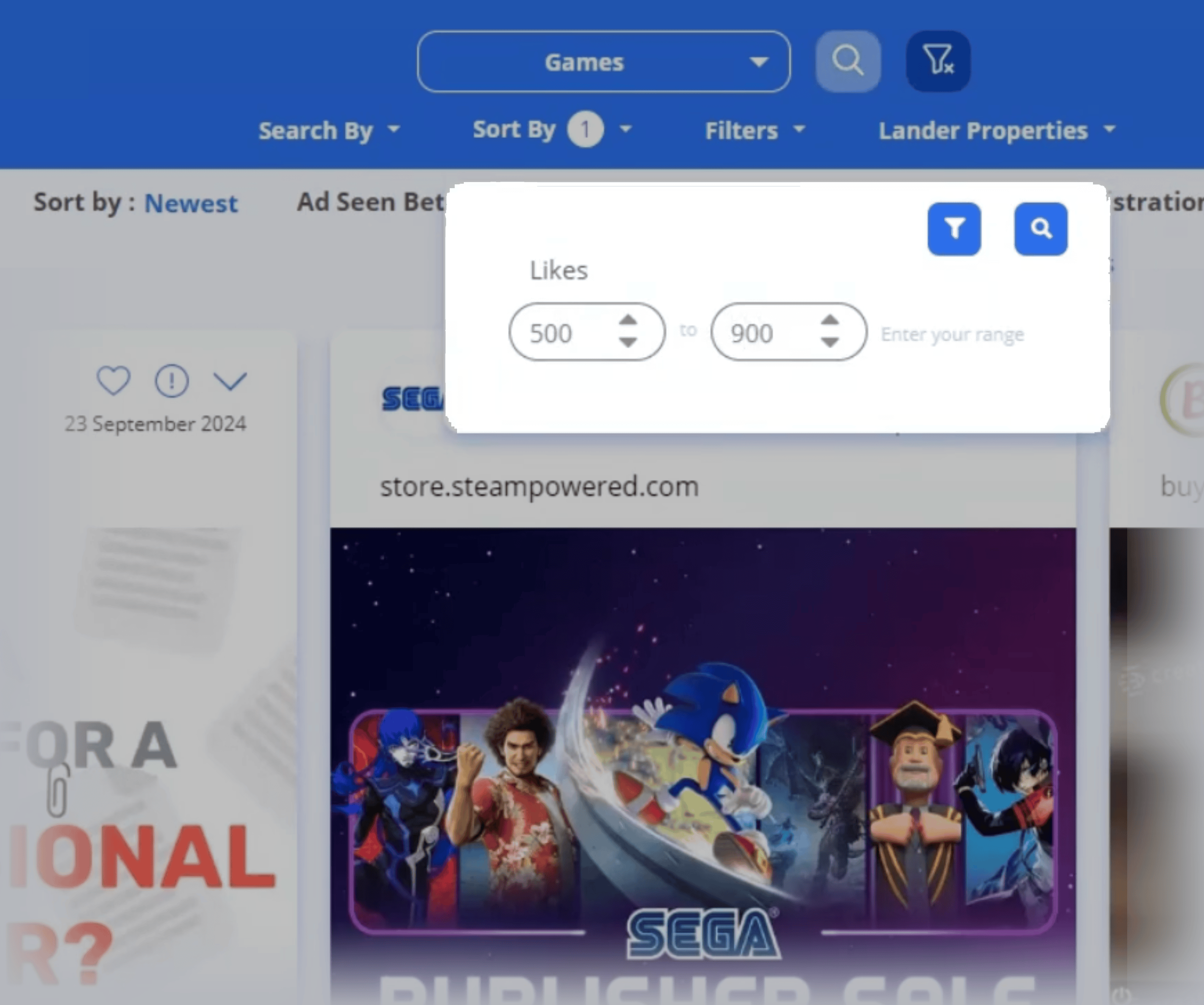
Include a custom “like” range so you narrow results to the level of popularity you prefer.
Then, zero in on the highest-performing ads and gather details such as ad copy and social engagement to improve your campaigns.
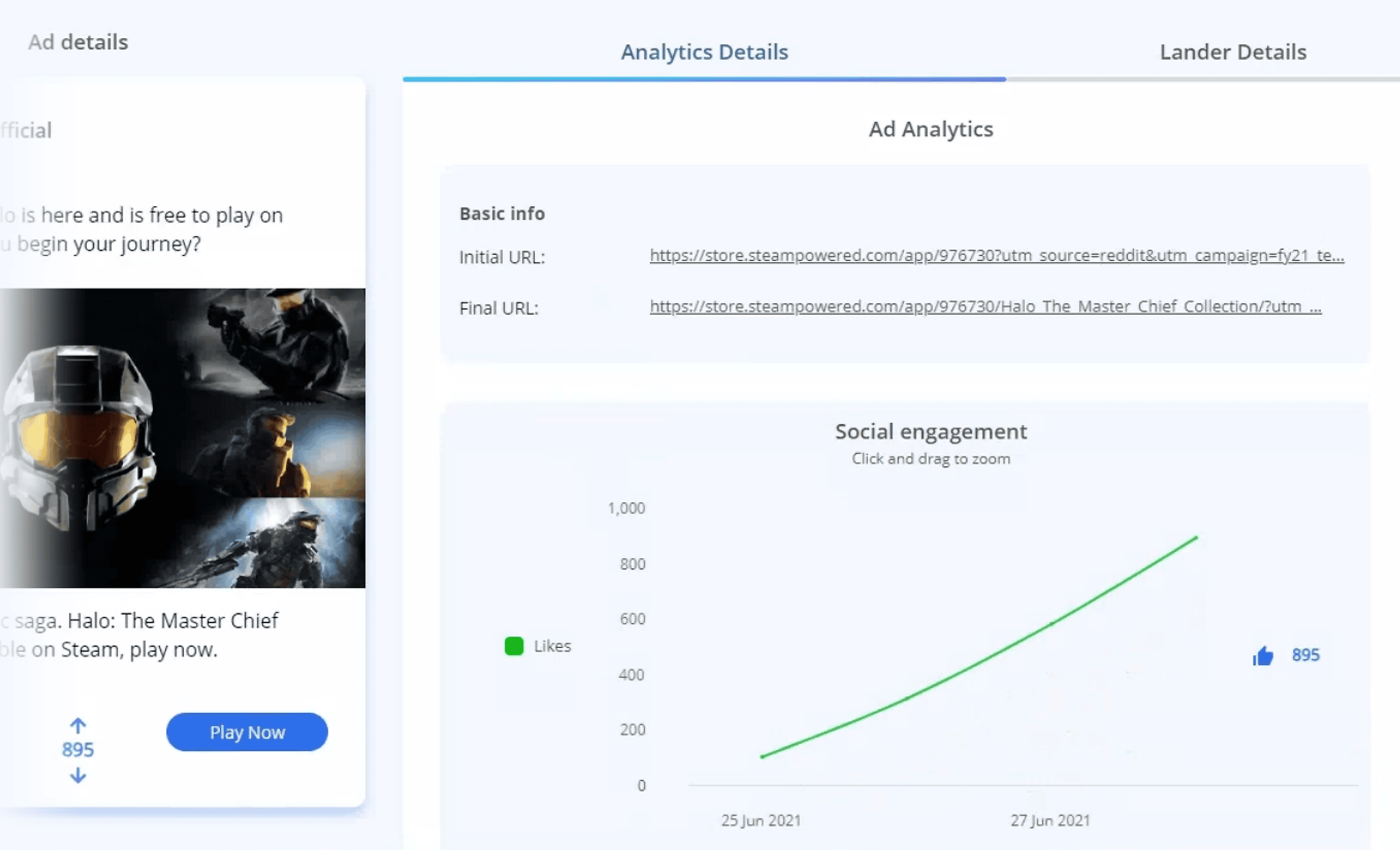
Pros and Cons
| Pros | Cons |
|---|---|
| Large, frequently updated database of social ads across 10+ major platforms | Mainly focused on social media; lacks advanced search or display ad data |
| Engagement metrics (likes, shares, comments) reveal which creatives actually resonate | Advanced filtering options are locked behind higher plans |
| Powerful filters for ad type, placement, geography, and CTA performance | Only the highest-tier plan includes insights from all 11 platforms |
Pricing
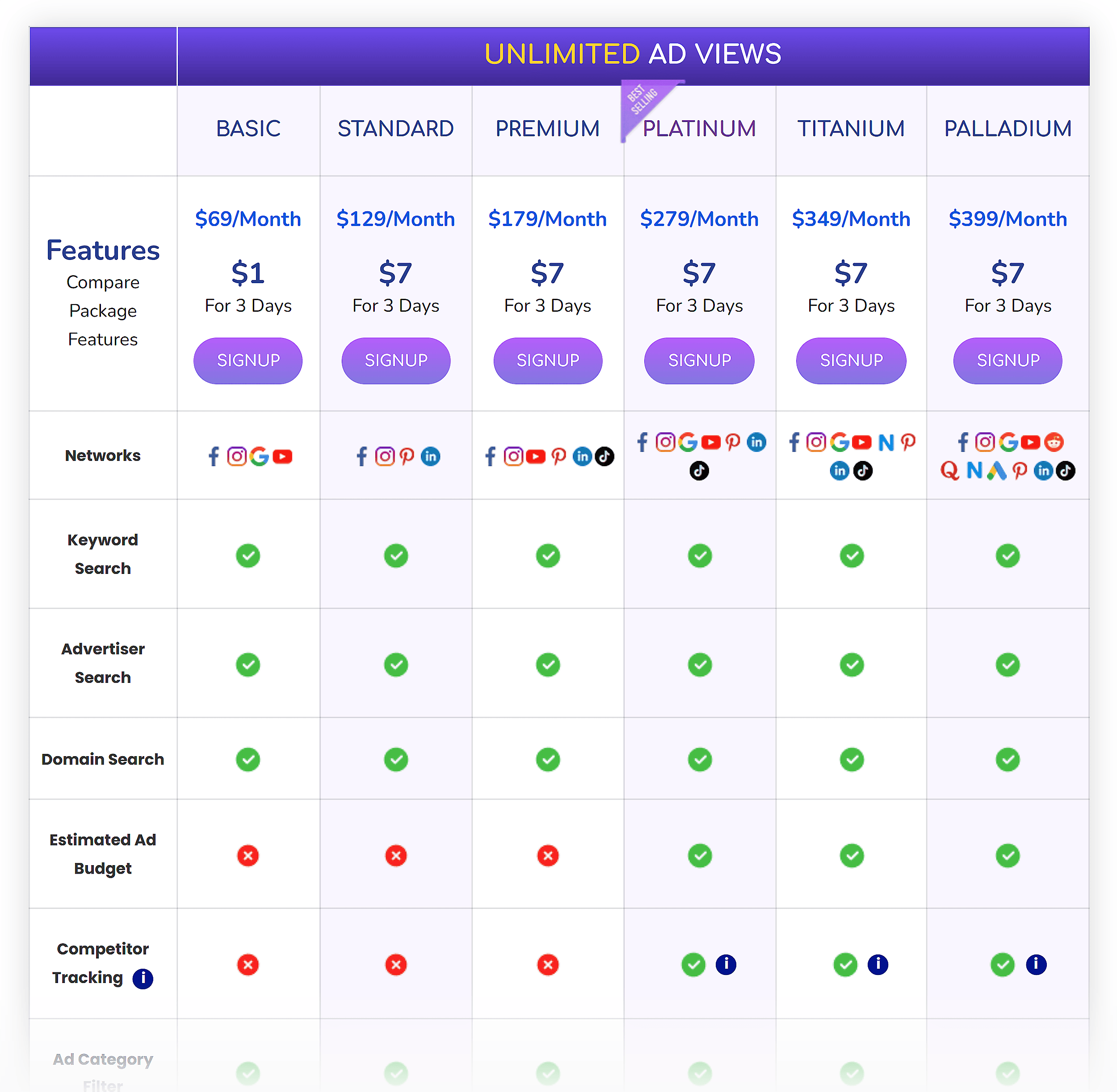
PowerAdSpy has six different plans.
The one you choose depends on the social platforms you want to analyze, and the features you need.
Only need Facebook, Instagram, Google, and YouTube?
(And don’t mind missing out on features like ad budget, ad type filter, and advanced analytics?)
The most affordable plan ($69/month) might work for you.
Need all the features and platforms? You’ll pay $399 per month.
5. Adbeat
Best for tracking competitor display ads and landing pages
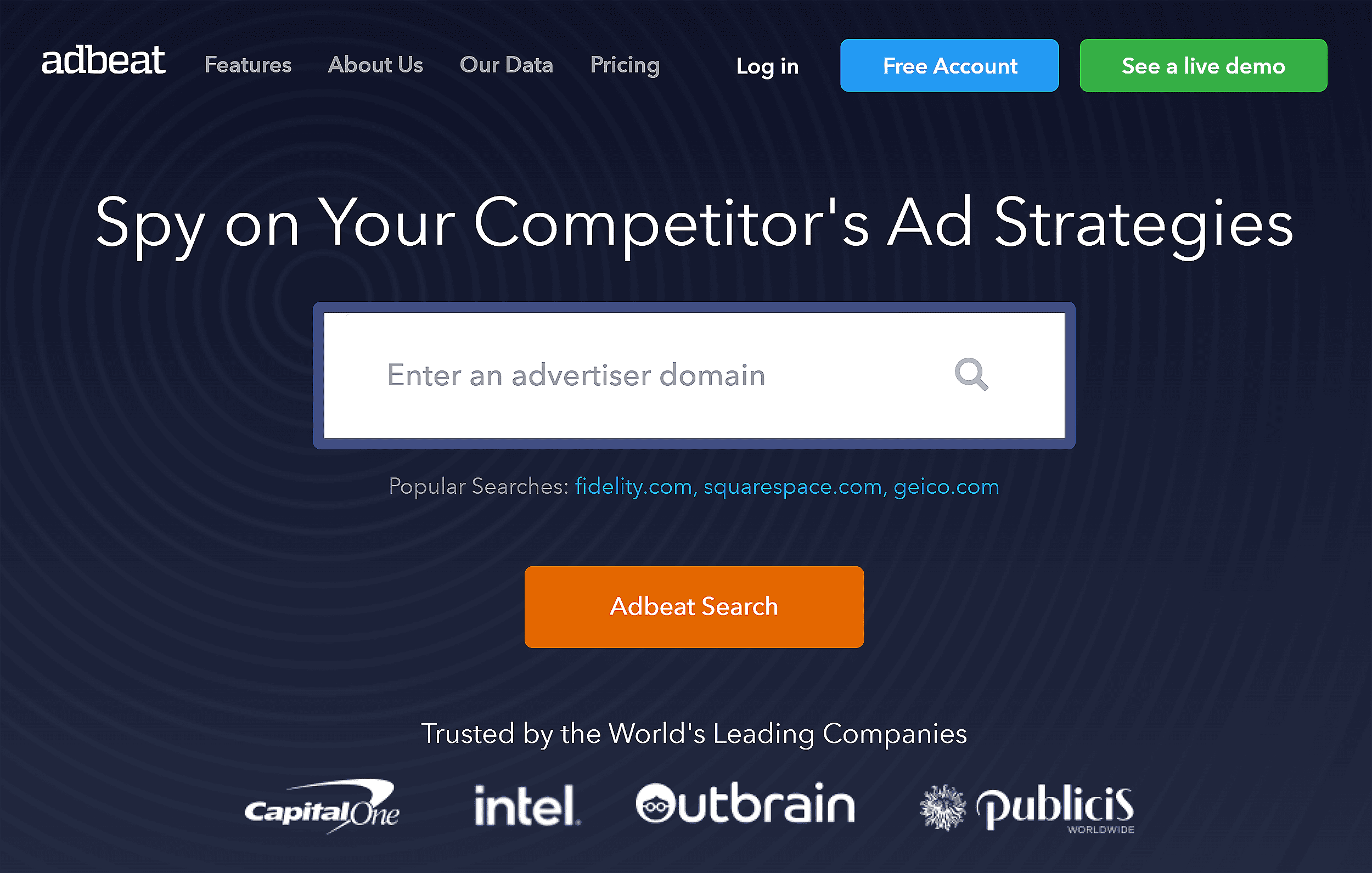
Adbeat specializes in display, native, and programmatic advertising.
But it goes beyond ad creatives.
You’ll also see landing page insights, so you get intel on the complete customer journey.
See Which Landing Pages Are Actually Converting
Adbeat shows you which landing pages drive the most ad traffic. And how long each page has been live.
For example, Squarespace’s longest-running landing page has been active for 794 days.
That’s over two years.
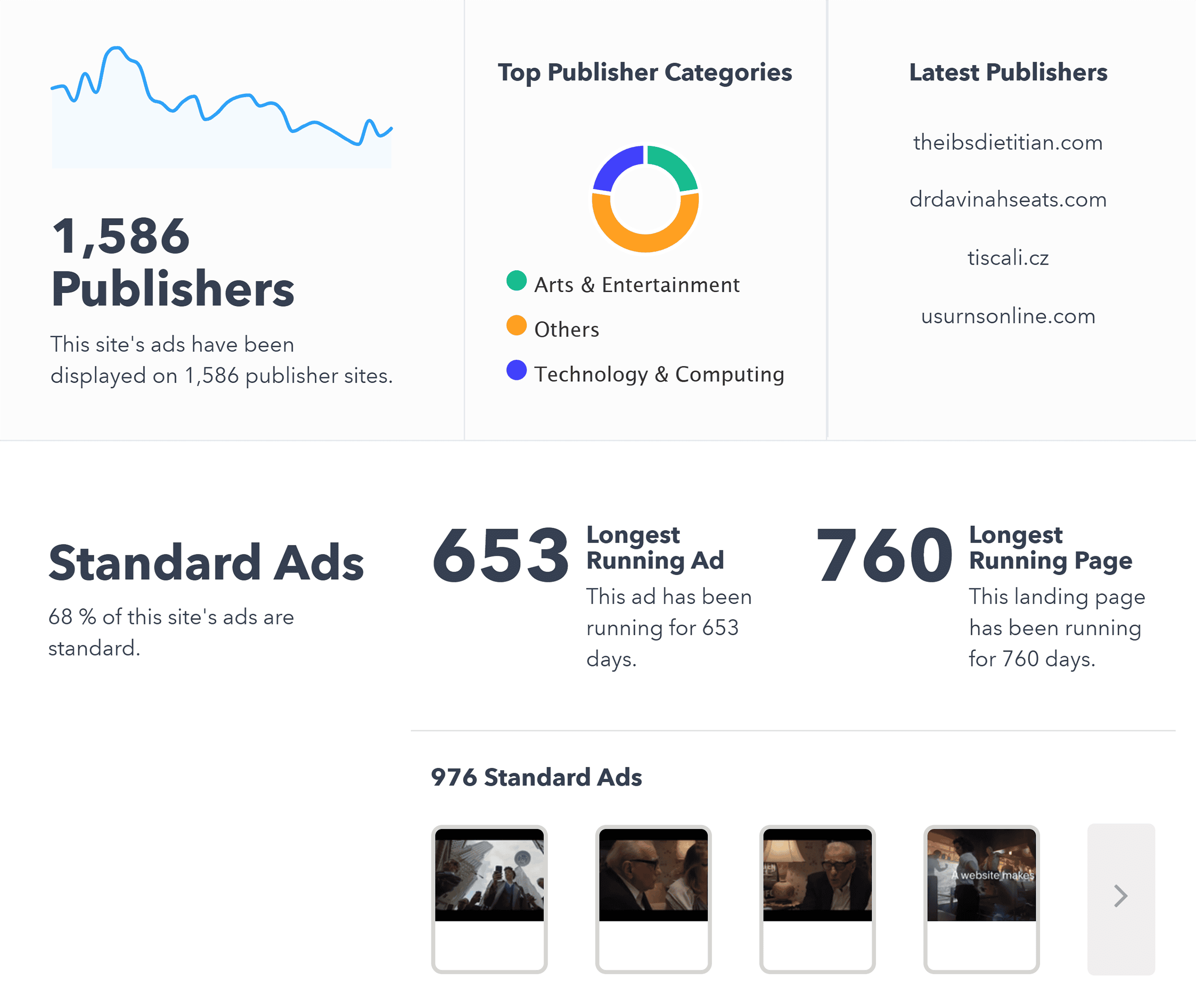
When a page stays live that long, you know it’s consistently converting.
This intel helps you see which page layouts, offers, and messaging are worth replicating.
If you work for an agency and have multiple clients, this is particularly valuable. It’s a fast way to benchmark what “good” looks like in each vertical.
Reveal Media Buying Strategies and Publisher Insights
The Advertiser Dashboard breaks down where competitors allocate their budgets across channels, networks, and publishers.
You’ll also see share-of-voice data to understand their market presence.
For example, Adbeat found that Squarespace ran 524 ads in one month.
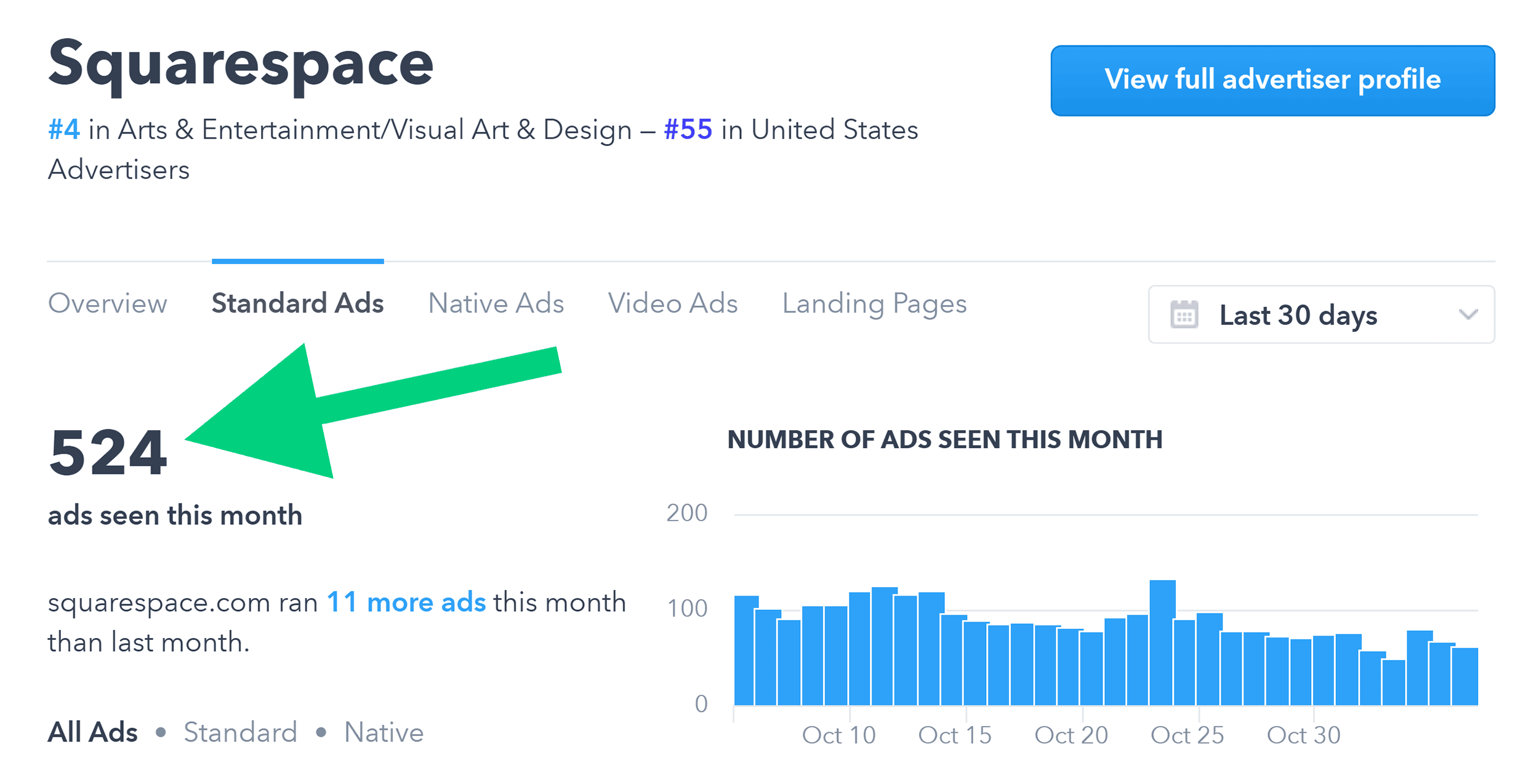
And 78% of their spend went to programmatic ads.
Details like this highlight which channels matter most in your niche. And where you can reallocate budget to get better performance for your own campaigns.

Benchmark Campaign Performance and Spot Trends
Adbeat’s ad intelligence software lets you monitor how your competitors’ budgets shift over time.
But what’s especially helpful is that they break it down by ad type: standard, native, and video.
For example, Squarespace’s longest-running video ad has been live for 413 days.
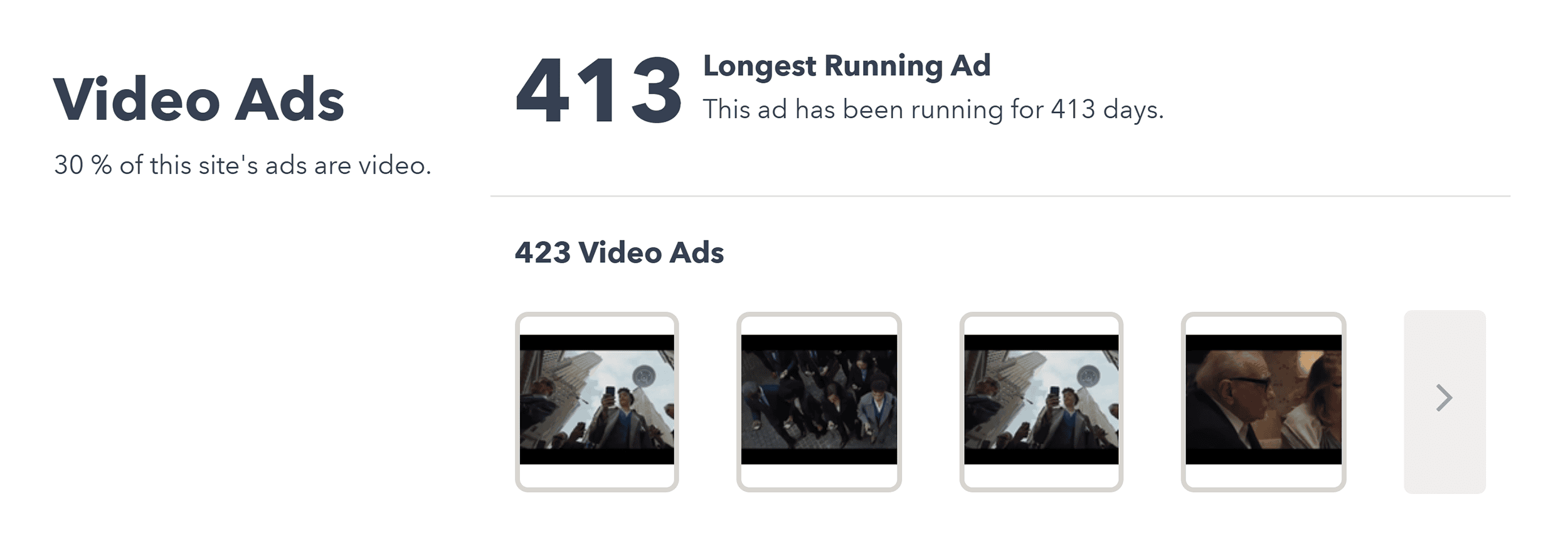
If they’ve kept it running that long, it’s a moneymaker.
In other words, it’s worth considering if you’re investing enough in video ads. And studying individual high performers for hooks, visuals, and offers.
Pros and Cons
| Pros | Cons |
|---|---|
| Lets you analyze ads and landing pages together for complete funnel insights | Limited coverage of search and social campaigns |
| Reveals media spend, publisher performance, and traffic sources | Pricing is higher than ad-creative-only tools |
| Great for agencies, affiliate marketers, and display-heavy advertisers | Enterprise pricing is not publicly available |
Pricing
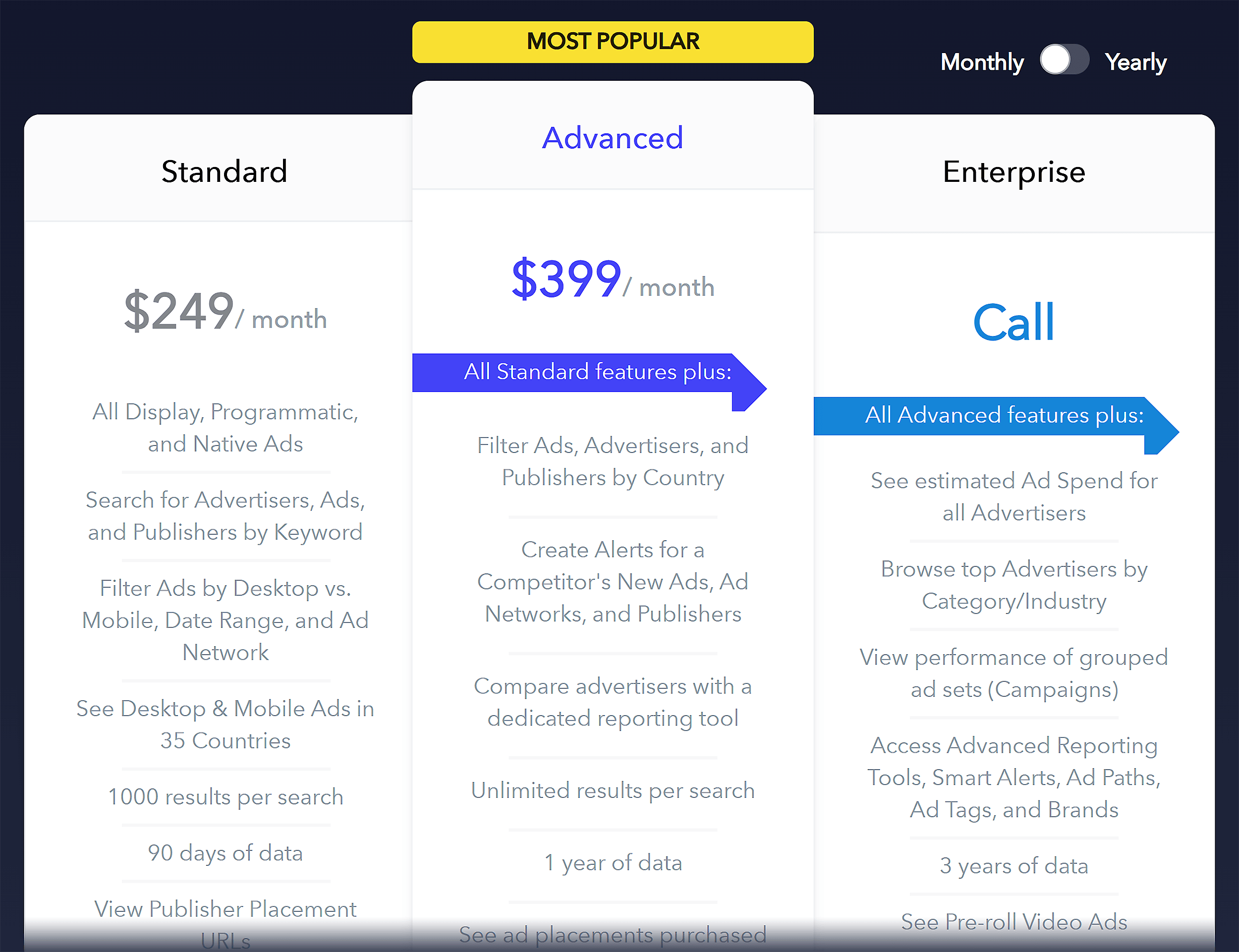
Adbeat’s pricing starts at $249 per month for display, programmatic, and native ad intelligence.
For advanced filters, alerts, and historical data, you’ll need the higher plan ($399 per month).
There’s also an enterprise plan, but pricing isn’t listed publicly.
6. Pathmatics by Sensor Tower
Best for enterprise-level ad spend intelligence across mobile, social, and video
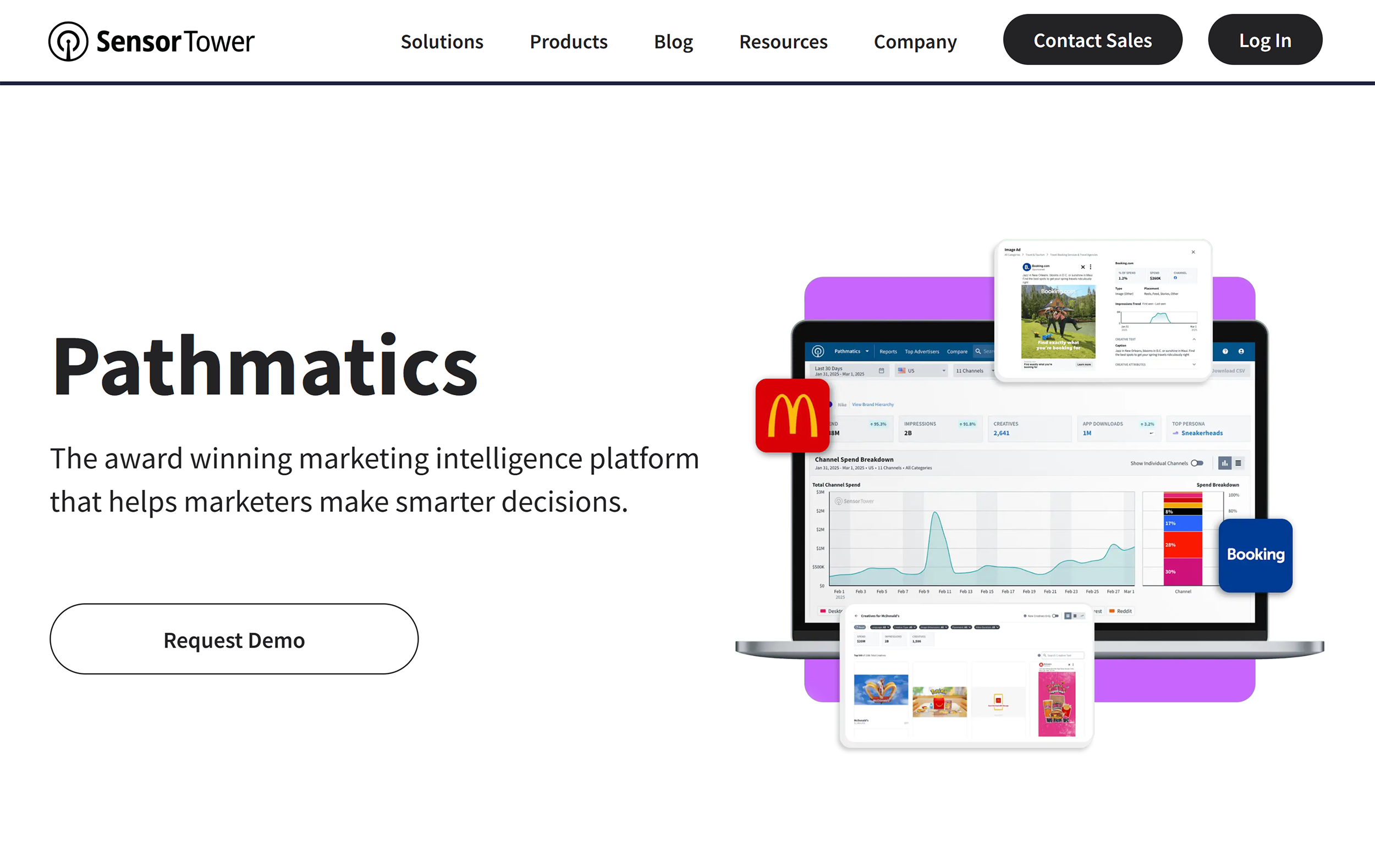
Pathmatics is built for large teams and big brands.
Household names like P&G and Unilever use this platform, so expect enterprise-level pricing and complexity.
But if you’re managing high-volume spend or reporting to leadership, it offers the transparency and benchmarking you can’t get from native tools.
Uncover Competitors’ Ad Spend Across Every Channel
Pathmatics shows you where every ad dollar goes in a pretty granular way.
It breaks down spend by platform, campaign, or creative — and tracks impressions, reach, and frequency over time.
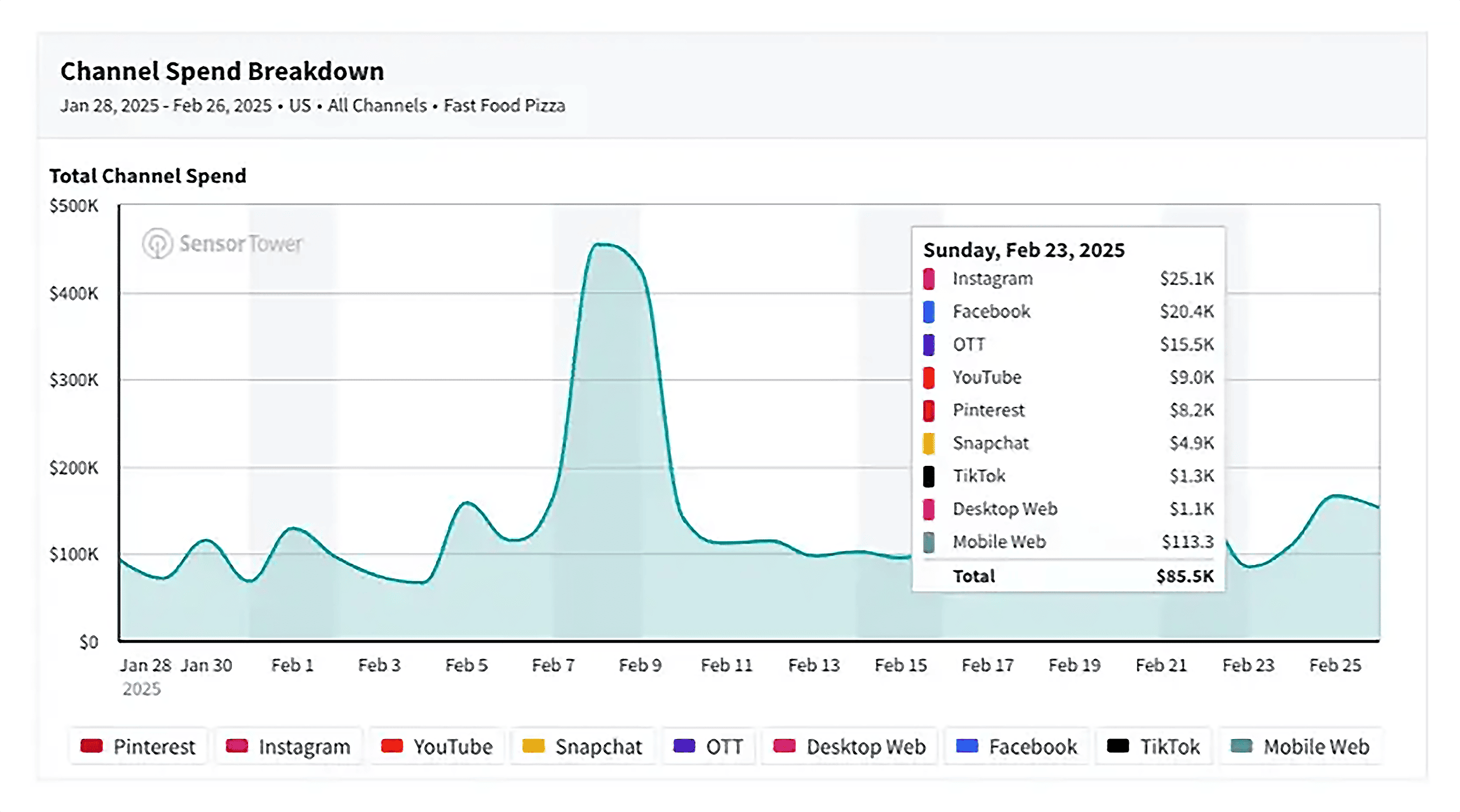
Say you notice a competitor’s Instagram spend suddenly increased by a significant amount in a single week during Q4.
That signals a major campaign launch — possibly holiday shopping or Black Friday prep.
With this data, you can adjust your strategy immediately. And compete head-to-head with your main competitors.
Pathmatics also lets you benchmark your ad spend against multiple competitors at once.
If you’re investing $500K on display while your top three competitors each spend $2M+, you’ll see that gap.
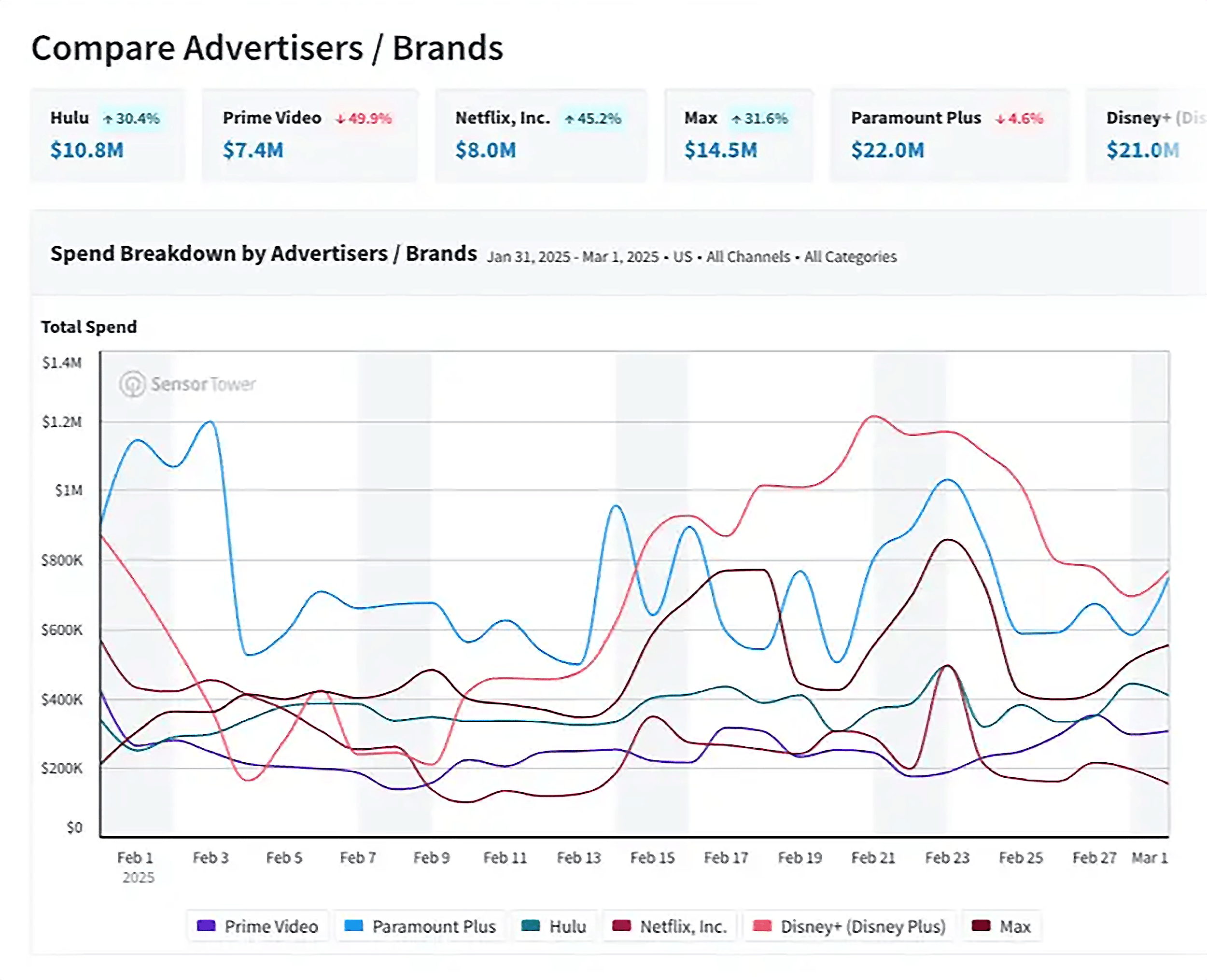
Use this data to justify budget increases to leadership.
Or to identify where smaller reallocations could close the gap faster.
Benchmark Market Share and Share of Voice
Pathmatics tracks your share of voice against competitors in your industry and region.
If three brands dominate 80% of impressions in your category, you’ll see who owns what percentage.
This data helps you understand your position in the market.
Are you a distant fourth? Or neck-and-neck with the leader?

You can also identify which competitors dominate specific channels and spot opportunities where they’re underinvesting.
If the market leader owns Facebook but ignores TikTok, that’s your opening.
Evaluate Creatives That Resonate
Every ad includes details like format, placement, messaging, CTAs, and audience profiles.
See which creatives competitors keep running and which ones they kill after a few days.
Track the exact messaging and offers that stick around for months or years.
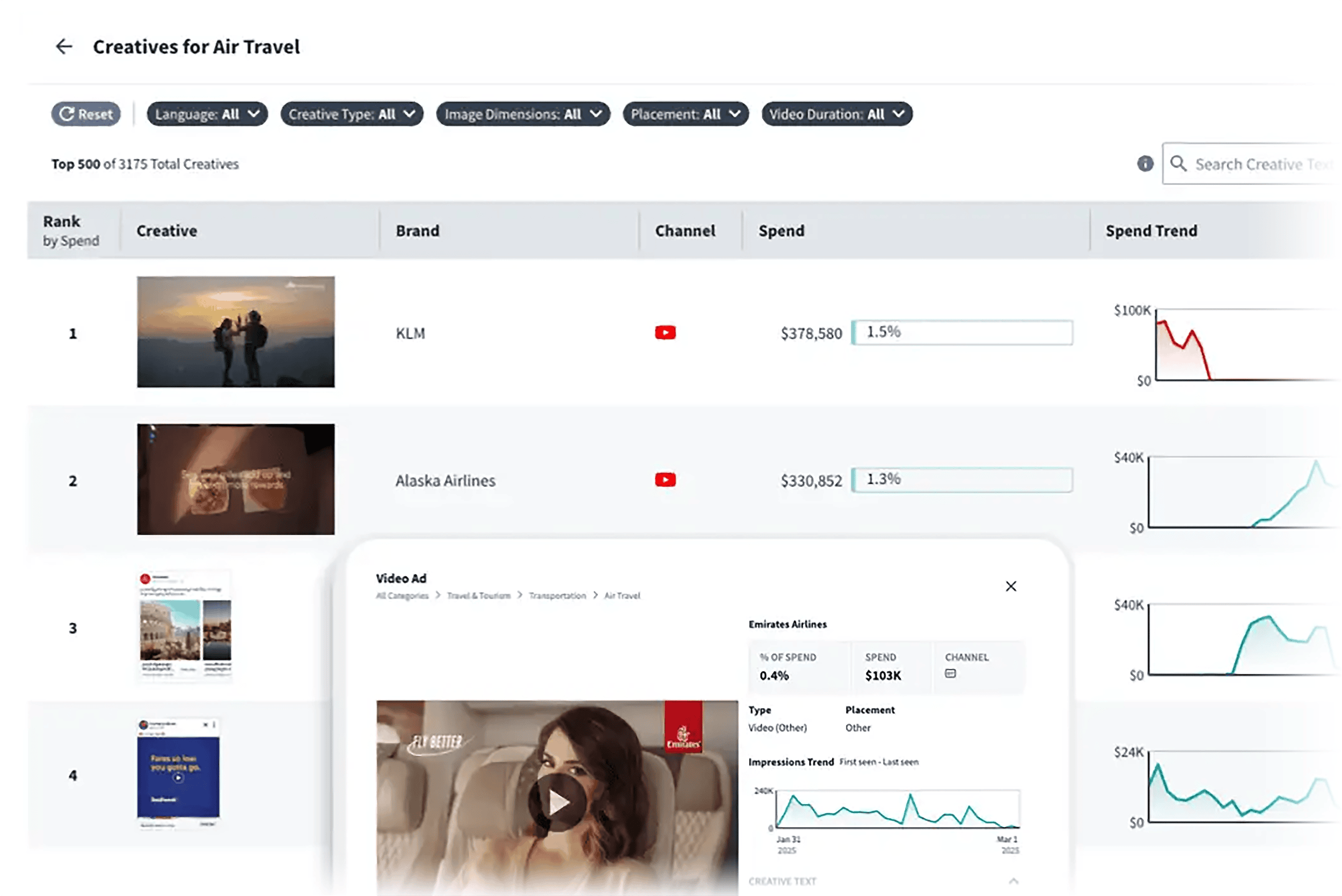
Use these insights to refine your own creative strategy.
Double down on formats that consistently deliver, and try localized messaging in new markets where your competitors are seeing success.
Pros and Cons
| Pros | Cons |
|---|---|
| Provides cross-channel visibility across social, display, mobile, video, and OTT | Pricing is custom and can be expensive for smaller teams and startups |
| Combines creative data with detailed spend, reach, and audience insights | Steeper learning curve due to platform depth and data complexity |
| Ideal for enterprise-level teams, app publishers, and multi-channel marketers | Some users report data accuracy issues |
Pricing
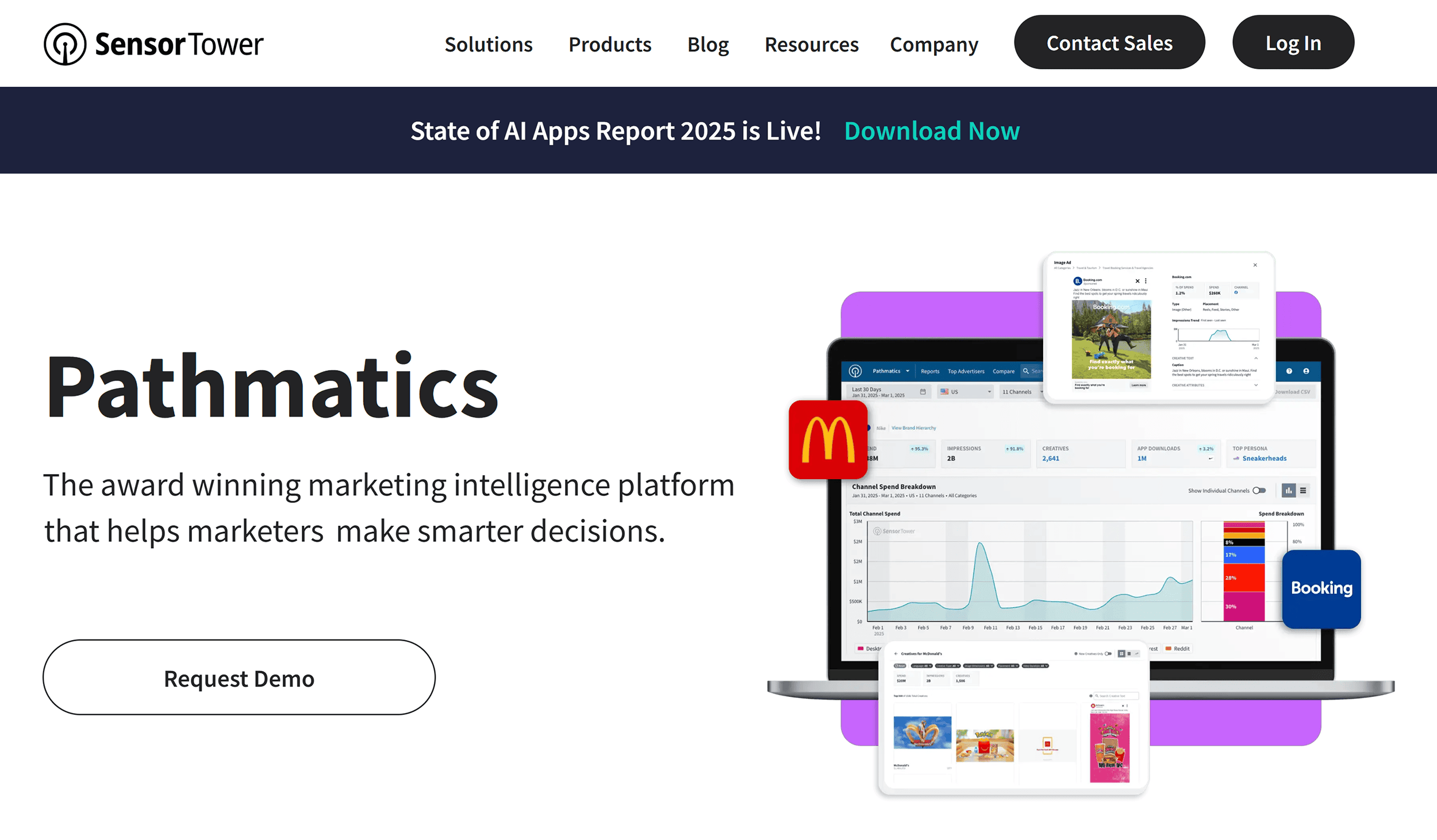
Pathmatics’ pricing is custom.
Request a quote if you’re interested.
Turn Competitive Intel into Campaign Wins
The right ad intelligence software isn’t the one with the most features.
It’s the one you can trust.
This means reliable data, less manual work, and the ability to scale campaigns across platforms with ease.
On a budget and focused mainly on Google Ads? Start with SpyFu.
Need deep, multi-site advertising intelligence across search and social with campaign execution built in?
Go for Semrush’s Advertising Toolkit.
Once you’ve picked your platform and gathered competitive intel, the next step is making sure your paid and organic strategies work together.
Learn how to align SEO and PPC to maximize visibility, reduce wasted spend, and improve your ROI.
Backlinko is owned by Semrush. We’re still obsessed with bringing you world-class SEO insights, backed by hands-on experience. Unless otherwise noted, this content was written by either an employee or paid contractor of Semrush Inc.


